IEEFA Energy Finance 2024: Accelerating the Energy Transition in Asia
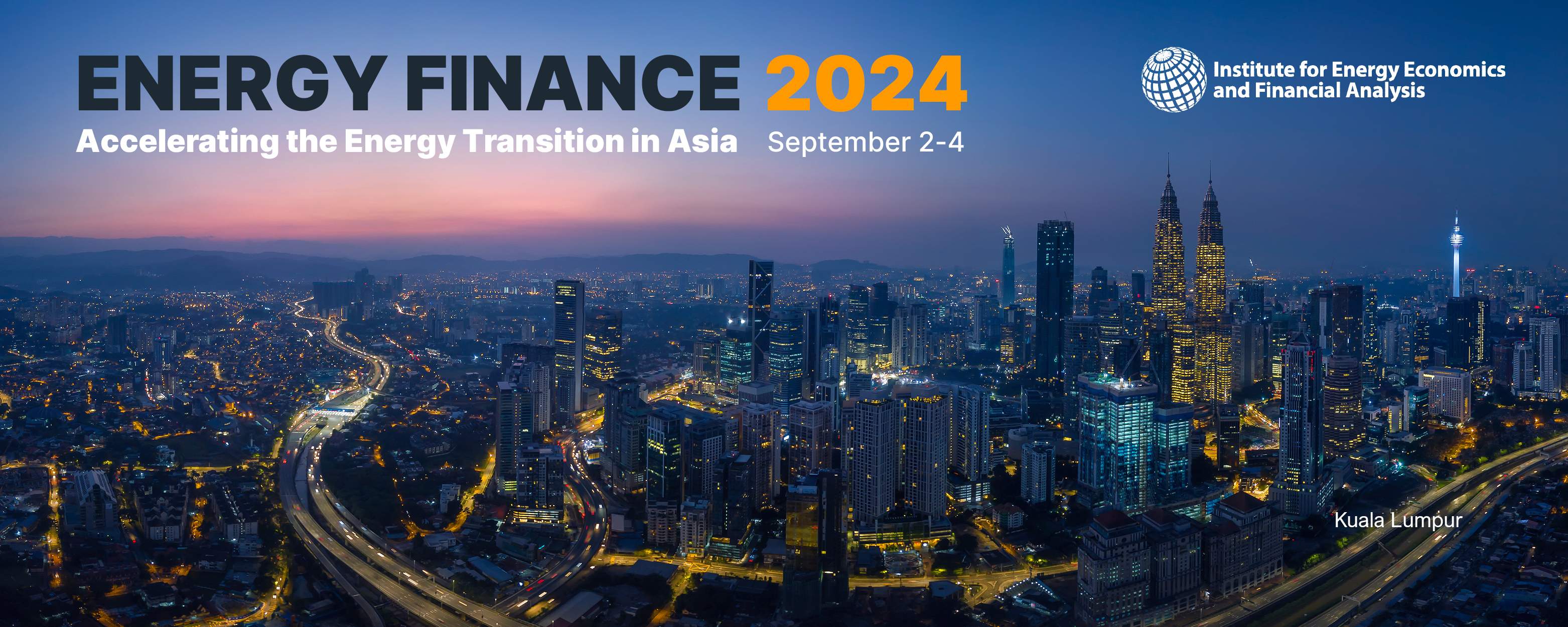
Watch the IEEFA 2024 Energy Finance conference highlights
Session Recordings and Presentations
Workshop: JETP and Just Transition
The workshop on the Just Energy Transition Partnership (JETP) and Just Transition provided a comprehensive breakdown of JETP's national and deal-level components. Moderated by Grant Hauber, featuring experts Ajay Kumar Rastogi, Swati Dsouza, Putu Indy Gardian, Dr Dinita S., Pradip Swarnakar, and Sangeeth Raja Selvaraju, this session offered valuable insights into the just transition framework.
Key topics covered:
🔸 Indonesia’s JETP Experience: National transition plan considerations, challenges and opportunities
🔸 Financial Tools and Structures: Using financial instruments, structures, and institutions to achieve transition investment
🔸 Ensuring Sound Social Outcomes: Identifying, quantifying, and planning equitable social transitions sub-nationally
This session was not recorded.
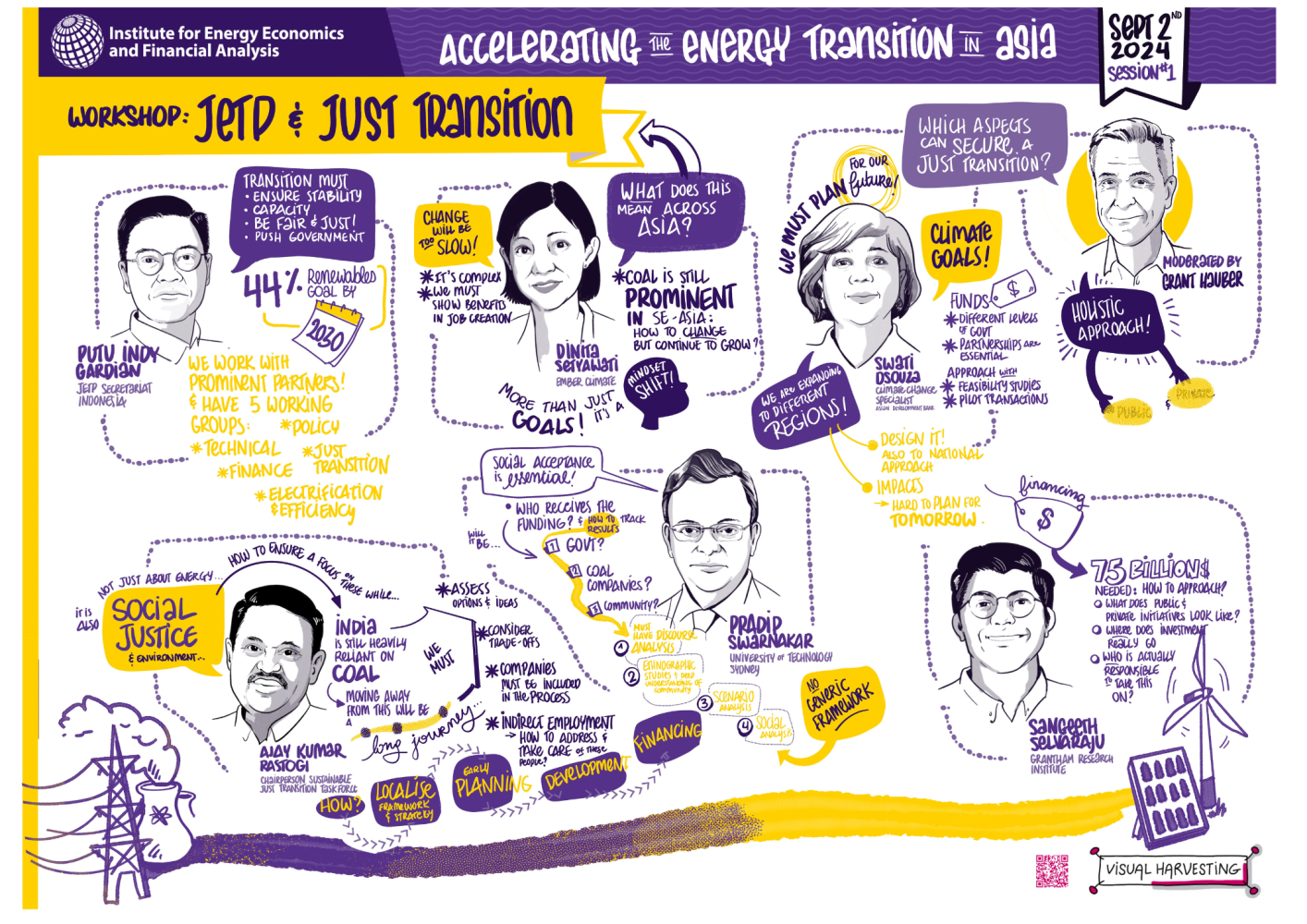
“The JETP represents a critical framework for ensuring that the energy transition is equitable and just for all stakeholders involved.” — Ajay Kumar Rastogi
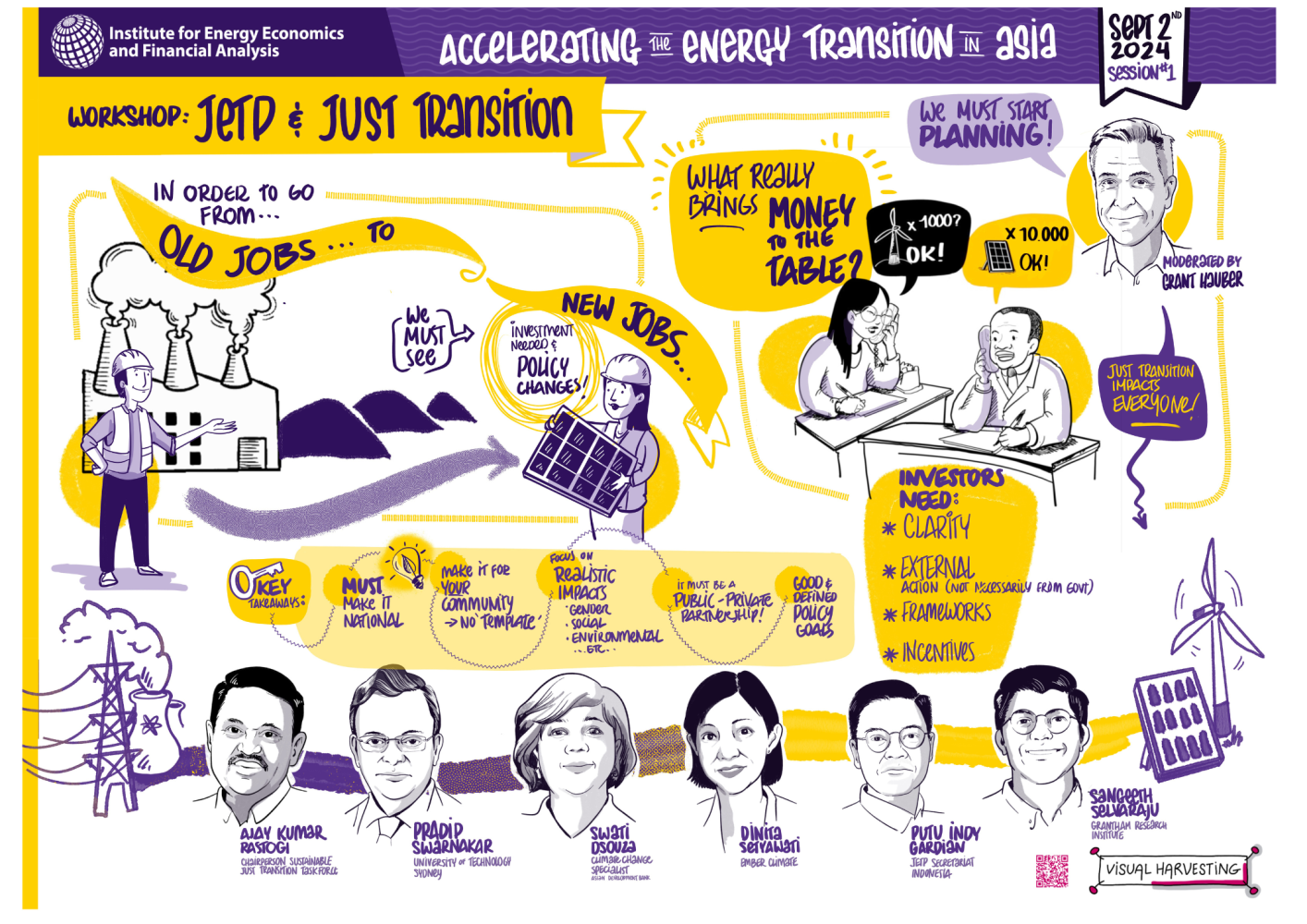
“To make it work, we need to make it local with plans that are bespoke to circumstances, and the communities as broadly defined as possible to properly quantify the impact. No one entity is going to this alone. We need to have well-defined policy goals and plan early.” — Grant Hauber

Workshop: Decarbonizing Transport and Driving Investment
This workshop on the decarbonization of medium- and heavy-duty vehicles was moderated by Charith Konda and featured experts Mahua Acharya, Stephen Bygrave, Vijay Aswal and Jayant Prasad. It explored strategies to reduce fuel consumption and drive investment in cleaner technologies. This session was not recorded.
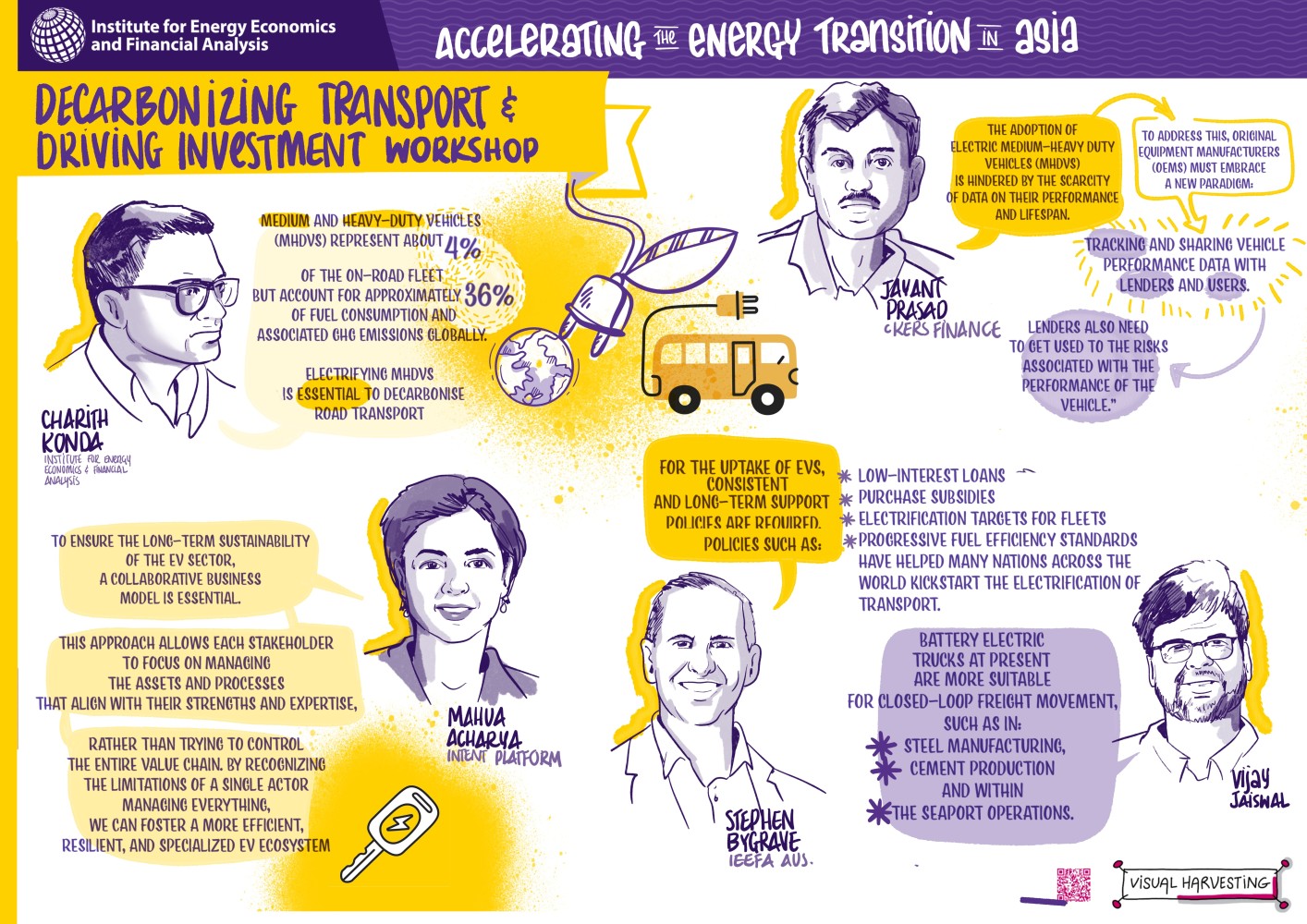
“Decarbonizing transport is essential for reducing overall emissions, and strategic investment in this area can drive significant change.” — Mahua Acharya

Workshop: Corporate Decarbonization in the Evolving ESG Ecosystem
Session panelists Rohan Bowater, Shubhashis Dey, Swasti Raizada, Alexander Hogoveen Rutter, Satish Sangu, Jonathan Yeo, and Chi Xiang Wong exchanged their insights on #ESG disclosure and corporate decarbonization strategies. Shantanu Srivastava, CFA facilitated the robust discussion on advancing sustainable finance.
Key takeaways:
🔸 Enhancing Sustainable Finance through Targeted Capacity-Building Initiatives: By investing in comprehensive training and support programs, regulators can improve the effectiveness of policy advisories, and foster better engagement with policymakers.
🔸 Standardization of Taxonomy: The development of a standardized taxonomy for green investments is essential to ensure transparency and credibility in sustainable finance.
🔸 Engaging SMEs in Sustainable Finance: As small and medium enterprises (SMEs) play a crucial role in supply chains, improving their engagement with sustainable finance through targeted capacity-building and better support mechanisms is vital.
This session was not recorded.
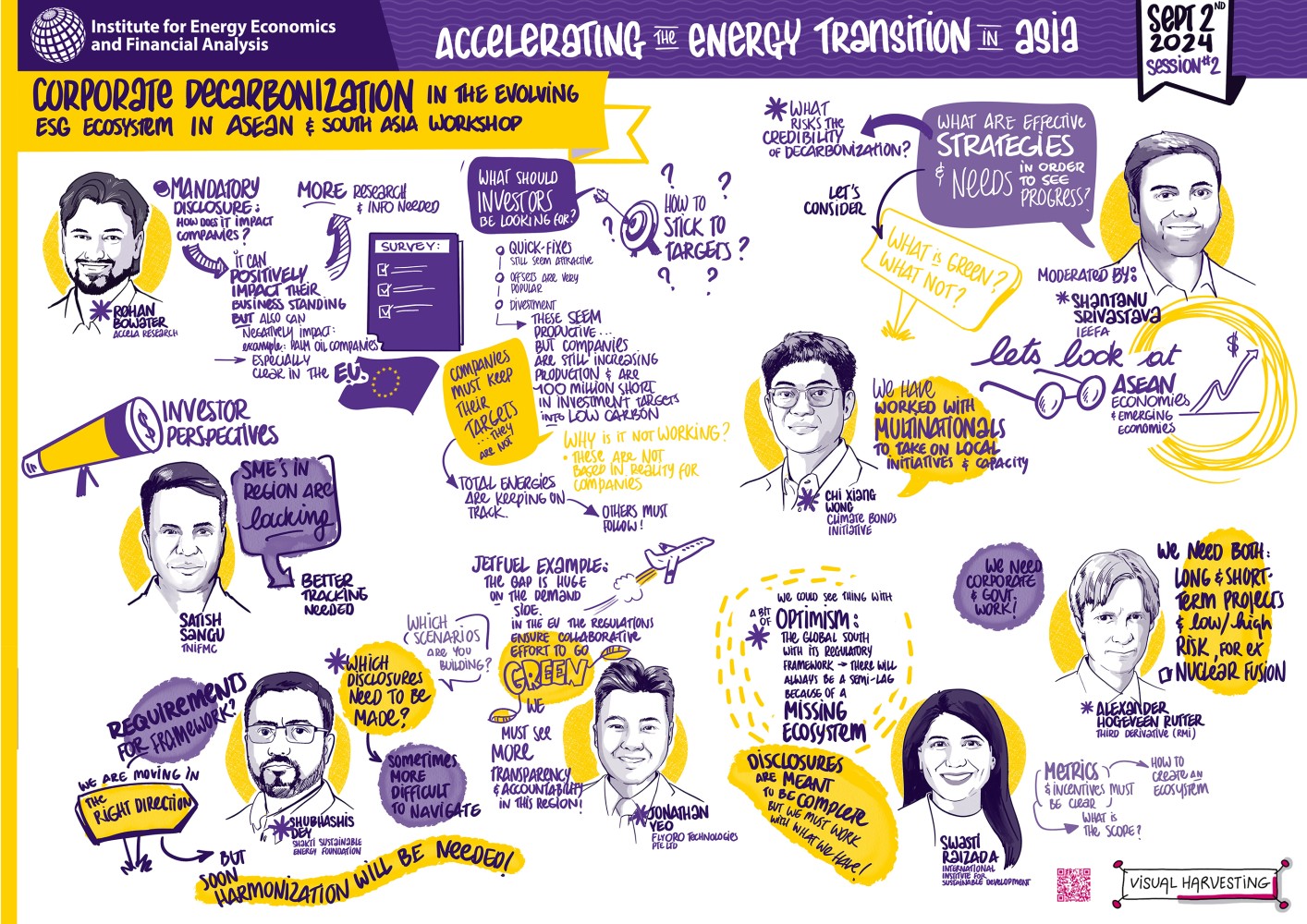
“Corporate decarbonization requires transparency and innovation, aligning with evolving ESG regulations and stakeholder expectations.” – Shubhashis Dey
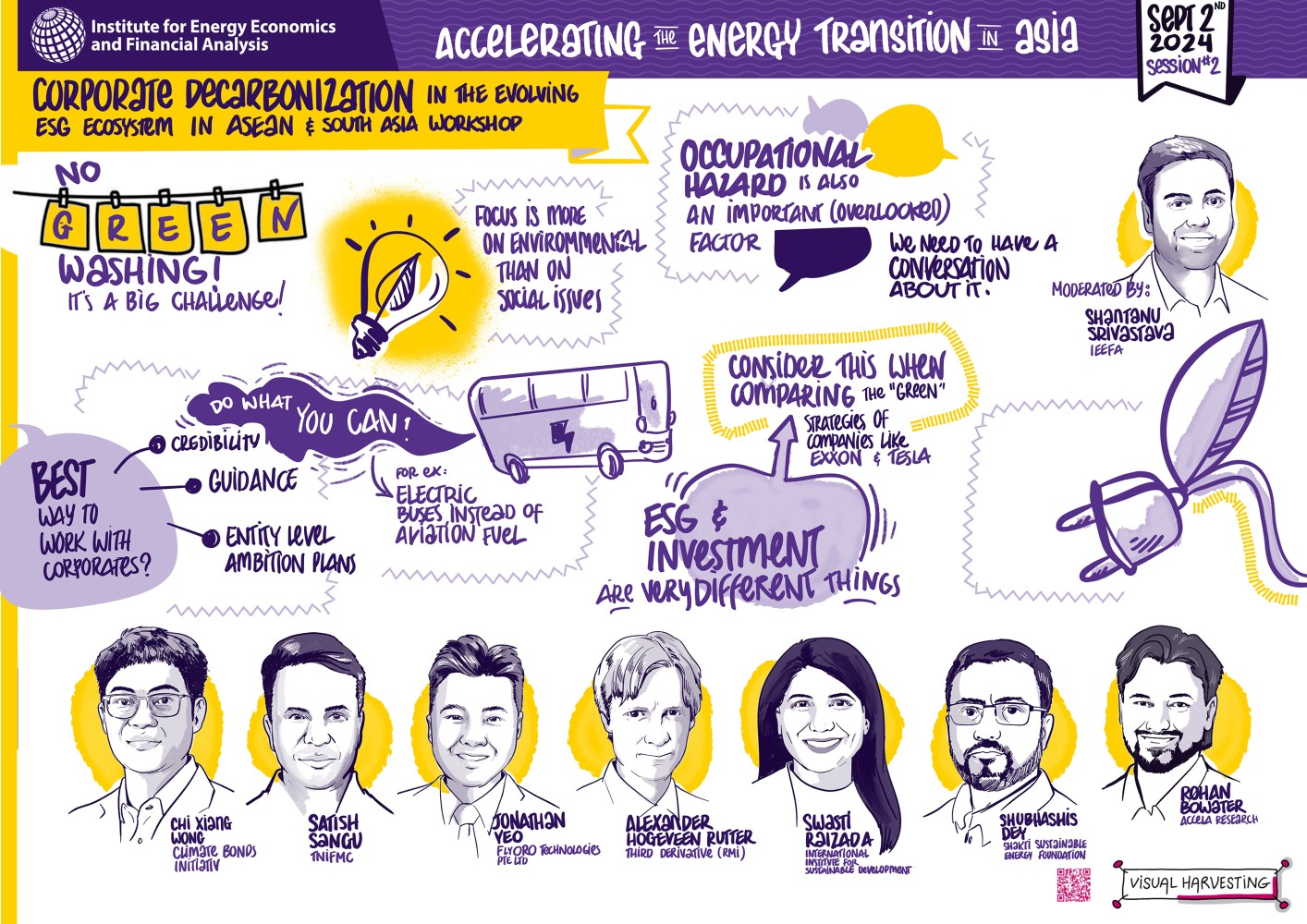

Workshop: LNG Carrier Market Trends: Enablers & Challenges
Hosted by Solutions for Our Climate, this session was moderated by Jamie Lee, and featured experts Sam Reynolds, Kevin Milla, Rachel Eunbi SHIN, and Gerry Arances. They examined the growth and challenges of the liquefied natural gas (LNG) carrier market, particularly in the context of recent geopolitical events.
Key discussion points:
🔸 Concerning rapid growth of the LNG carrier market over the past few years, particularly following Russia's invasion of Ukraine
🔸 South Korean shipyards dominate LNG shipbuilding, accounting for ~80% of the market.
🔸 Global LNG carrier shipping capacity is expected to peak in 2026, resulting in a 154% oversupply by 2035.
🔸 The LNG shipping capacity glut poses a significant risk of stranded assets.
This session was not recorded.
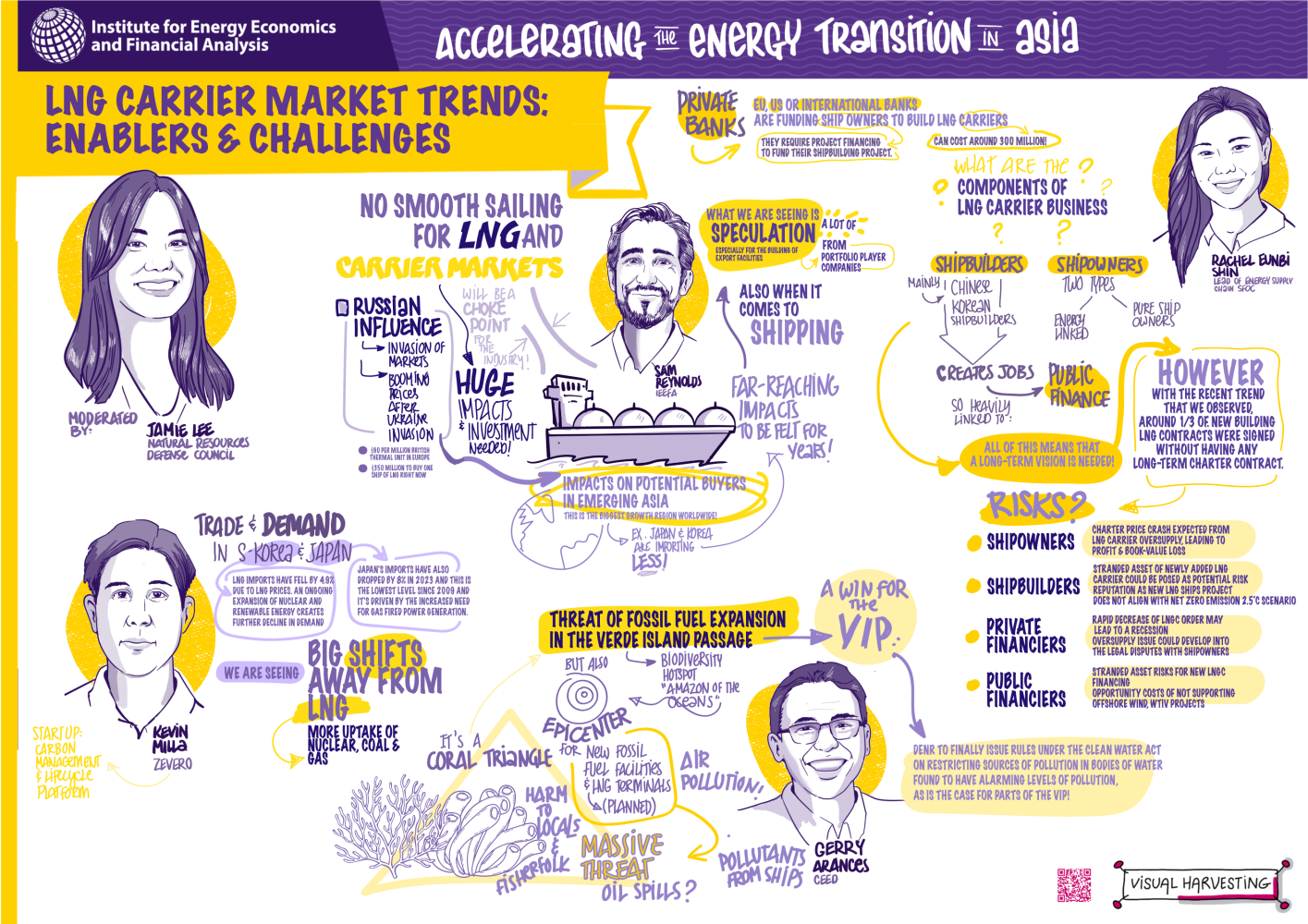

Welcome Address
Paige Nguyen, IEEFA's Director for Asia, officially opened the conference with a warm welcome and overview of the three-day event, which was live-streamed for a global audience.
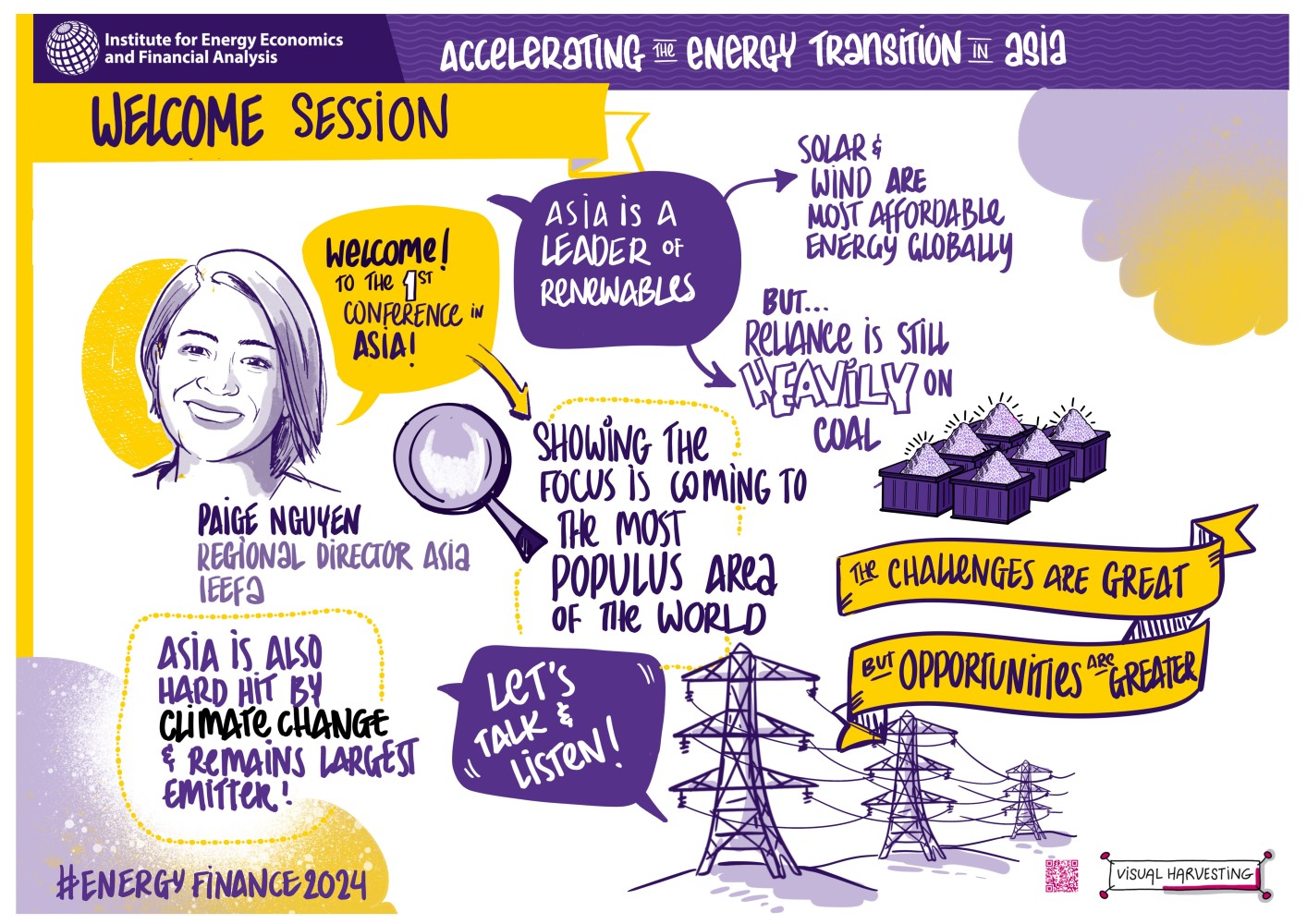
"Asia has the opportunity to significantly replace dirty, costly fossil fuel imports with domestically produced, stable, and clean energy. But misconceptions and vested interests persist. Our task is to clear the way, guiding the region away from false solutions and towards a sustainable and prosperous future. It is this mission that unites us all." — Paige Nguyen

Asia's Decarbonization Path: Ambitions, Action & Outlook
Featuring Vibhuti Garg, Dr Arunabha Ghosh and Dr Christoph Nedopil Wang, this session highlighted the crucial role of Asian economies in global climate goals and the steps needed to meet the #ParisAgreement targets. Leading experts shared these invaluable insights:
Vibhuti Garg, IEEFA's Director for South Asia: “2023 was the hottest recorded year. We need to act fast to avoid reaching a point of no return. This will require huge investments. Various estimates show we need to triple or quadruple investment to meet the Net Zero 2050 target.”
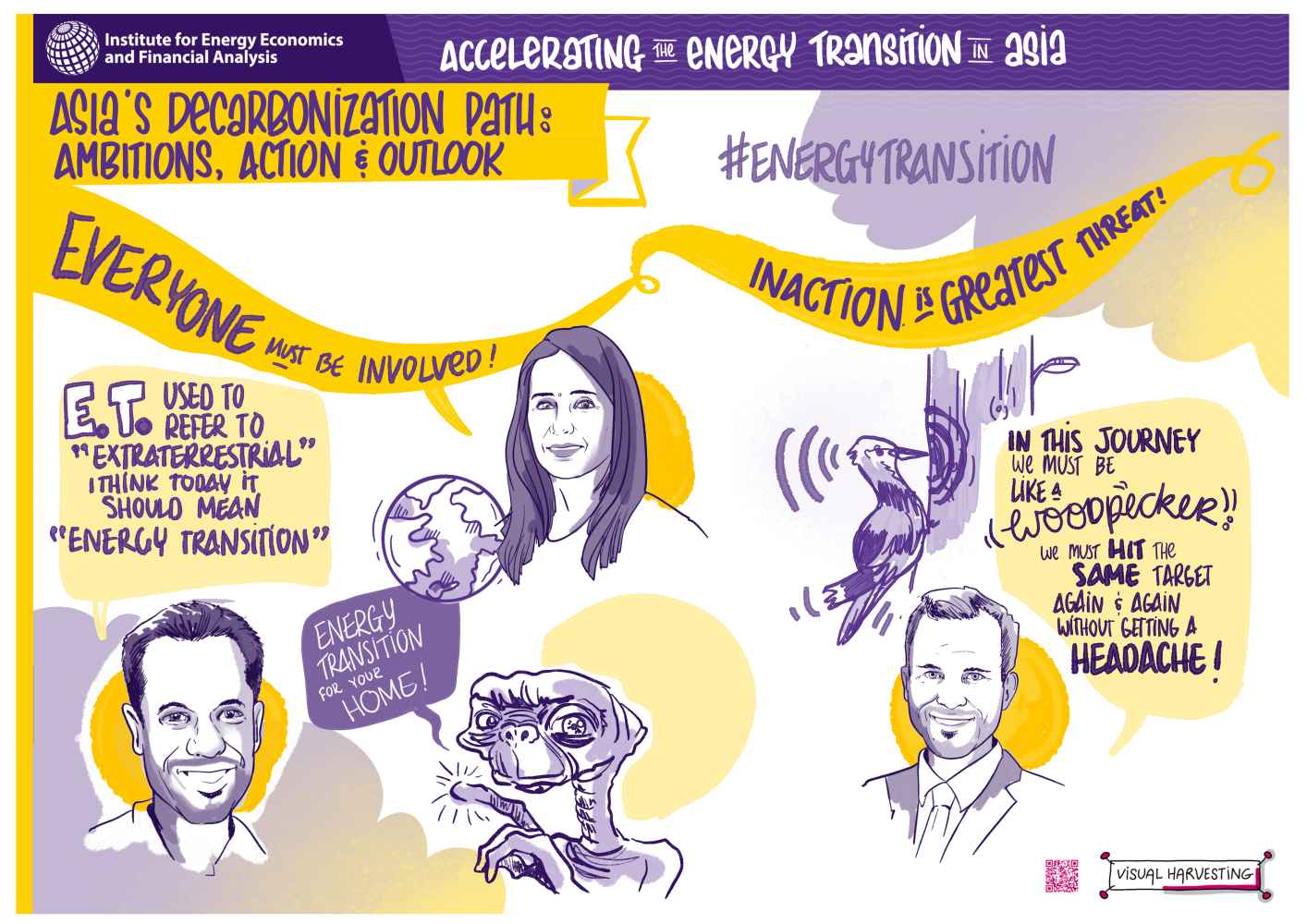
Dr Christoph Nedopil Wang, Director of the Griffith Asia Institute: “State-owned enterprises are the backbone of the energy transition in Asia. To meet climate goals, we must empower these giants to unlock green finance and lead the charge toward a sustainable future.”
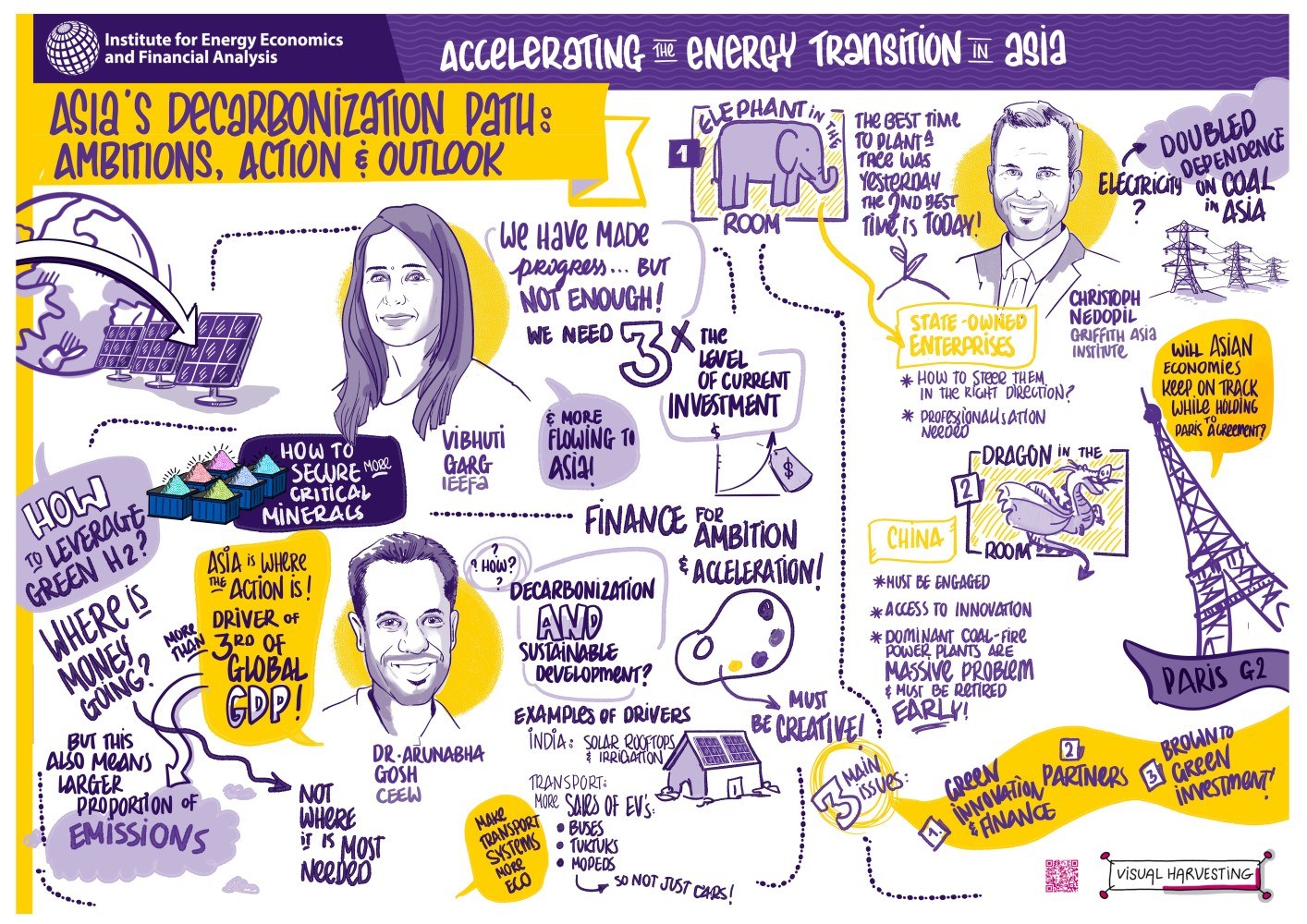

Asia Regional Outlook on the Future of Fossil Fuels
Session moderator Purva Jain and speakers Christopher Doleman, Ghee Peh, Dongjae Oh and Eleanor Whittle delved into the role of #fossilfuels in Asian economies, examining short- to medium-term impacts and strategies. It also highlighted IEEFA's recent publications, including the 2nd Global LNG Outlook, as well as the Australian Met Coal Outlook and India's SET report, which have extensively discussed the challenges of fossil fuel buildout in Asian economies.
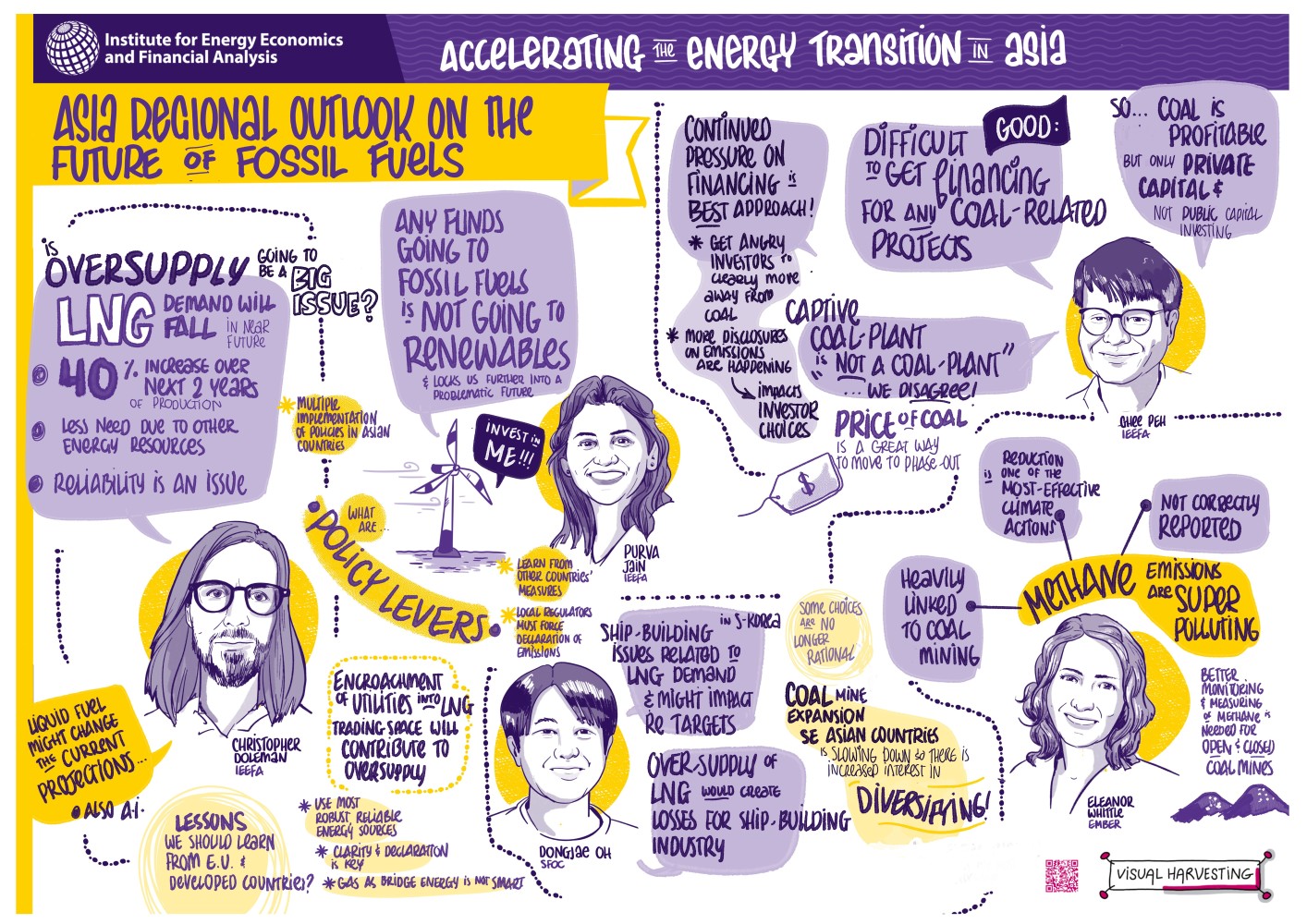

Catalyzing Private Capital for the Energy Transition in Emerging Asia
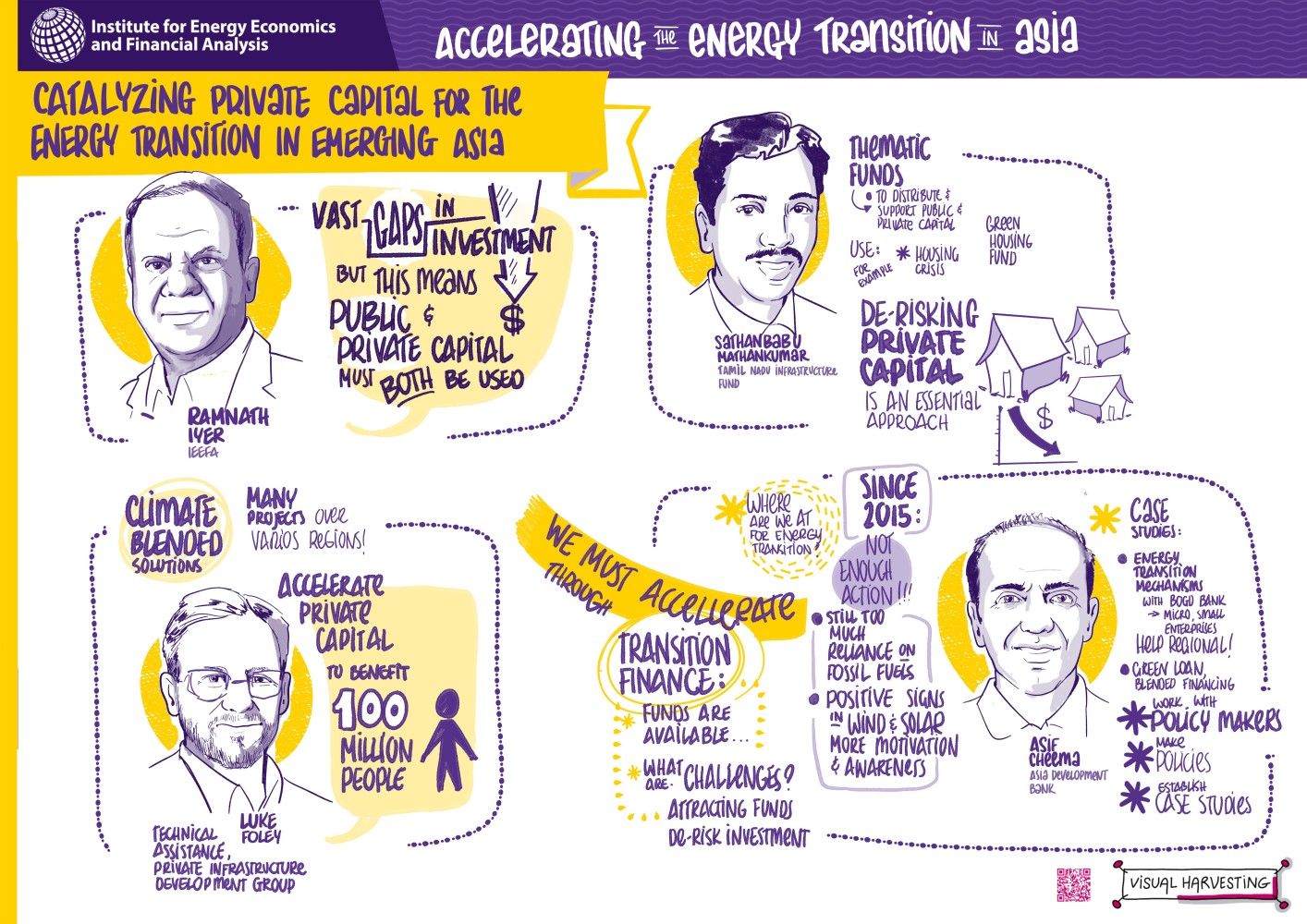
“Private capital is essential to bridging the investment gap needed to accelerate the energy transition in emerging Asia.” – Asif Cheema
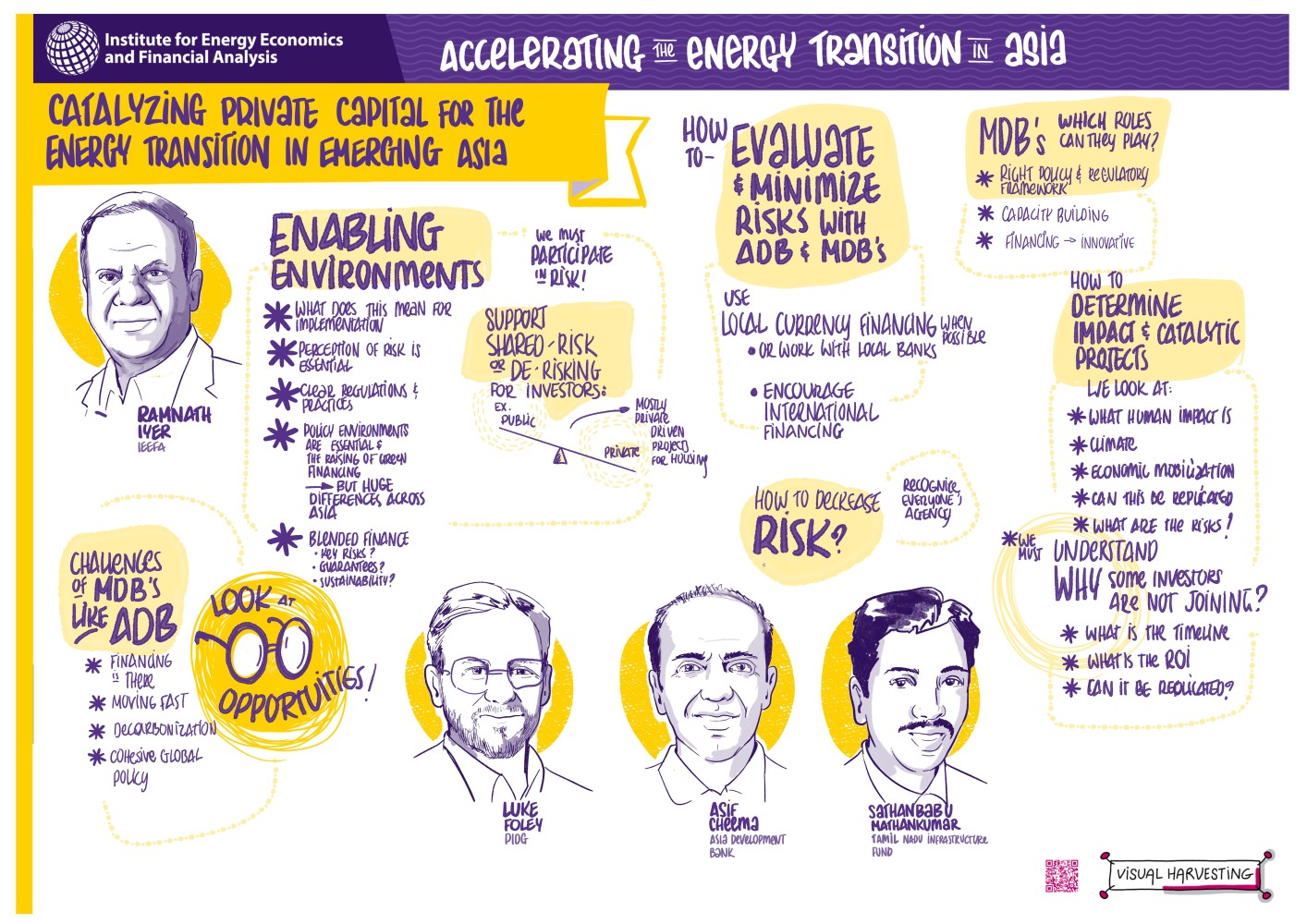

Regional Highlights — Energy Transition Success Stories: Natharoun Ngo Son
Natharoun Ngo Son of EnergyLab Cambodia, an innovative non-profit organization committed to accelerating the country's energy transition, showcased successful #energytransition initiatives across the region, offering inspiration and lessons learnt.
Key learnings:
🔸 Accelerating Clean Energy: Cambodia is set to achieve 2GW of solar power and 1GW of pumped hydro capacity by 2030 while advancing the development of wind farms.
🔸 Energy Efficiency: With policies aimed at reducing energy demand by 19%, #Cambodia is leading the way in energy efficiency.
🔸 Future Mobility: The goal of transitioning 70% of motorcycles and 40% of urban vehicles to electricity by 2050 is testament to Cambodia’s forward-thinking approach.
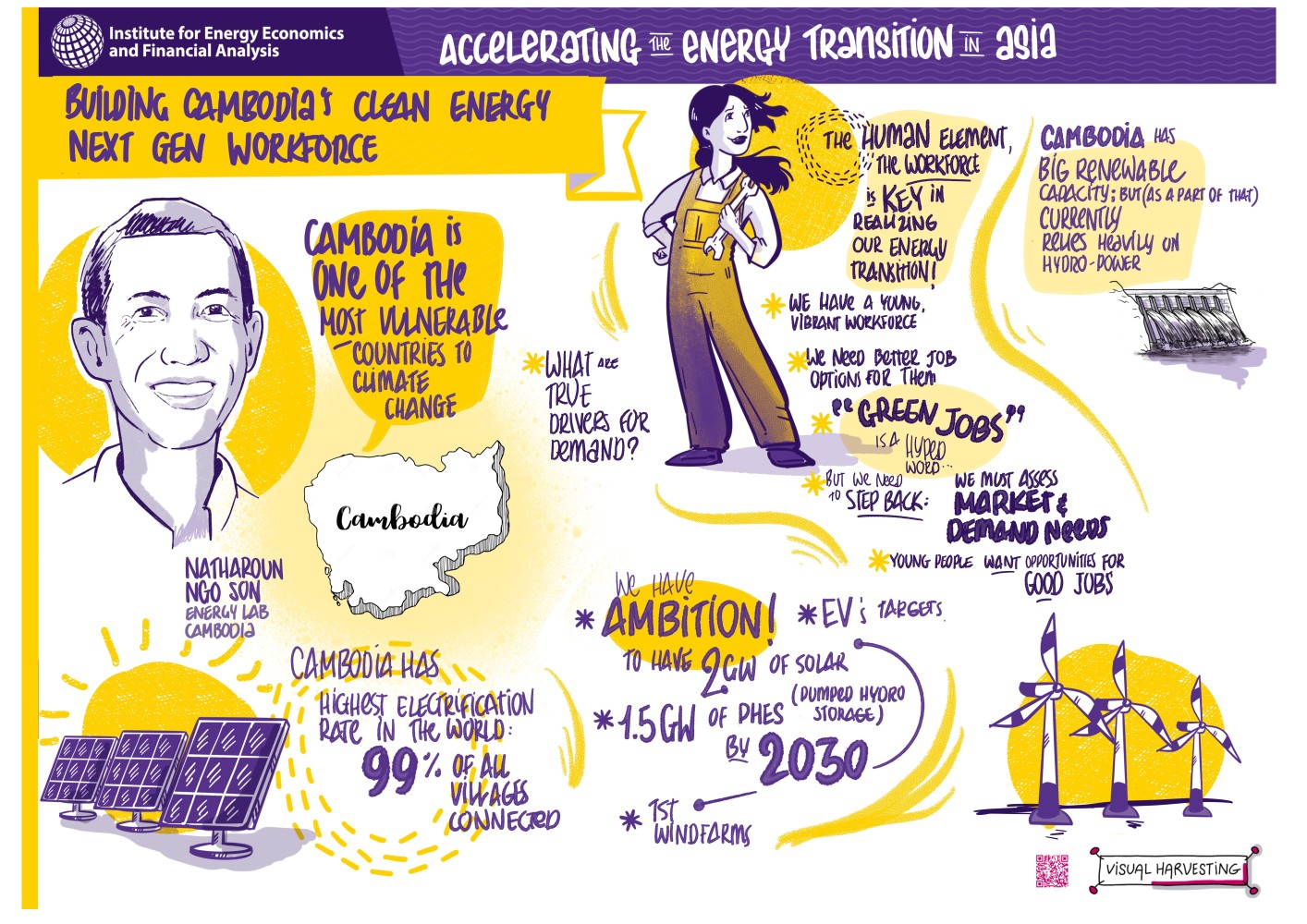
“Highlighting success stories is crucial for inspiring further action and demonstrating what is possible in the energy transition.” – Natharoun Ngo Son

Navigating an Energy Crossroads in Southeast Asia
This learning session, hosted by the Center for Energy, Ecology, and Development (CEED), spotlighted Southeast Asia at a crossroads as it rapidly expands its gas power capacity and transforms into a global LNG import hub. Speakers Gerry Arances, CEED Executive Director, and Sam Reynolds, IEEFA's Research Lead, LNG/Gas, Asia, presented the cases of Vietnam and the Philippines, two countries at the forefront of this challenge. They tackled how these countries can leverage their abundant renewable resources to lead the region toward meeting its climate goals.
This session was not recorded.
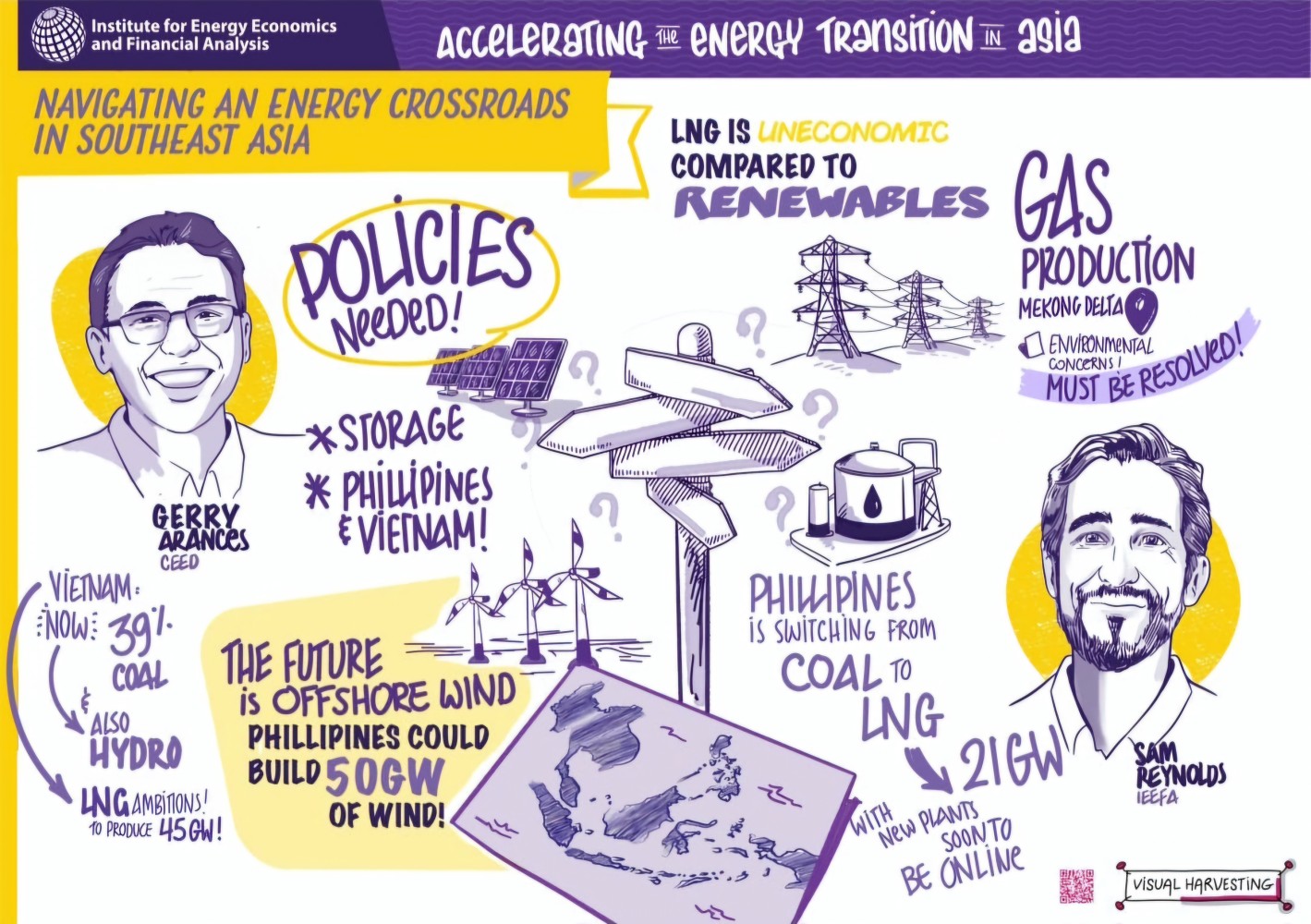

Unlocking Clean Energy Investments in South Asia: Addressing Credit and Forex Risks
Moderator Saurabh Trivedi and panelists Harald Hirschhofer, Lasitha Perera, Dhruba Purkayastha, PhD and Akhilesh Tilotia explored the challenges posed by credit and forex risks in clean energy infrastructure investments and delved into how local and development finance institutions are addressing these issues.
Key takeaways:
🔸 An idea proposed by the G20 policy paper to mitigate credit risk is to think about two central banks coming together — one from the global north and one from the global south, such that the currency risk of the emerging market can be parcelled away to a larger economy from which investments in the green ecosystem are emerging.
🔸 A successful energy transition requires debt sustainability. This can be done through capacity building, such as improving currency risk awareness and management of borrowers. Concessional lenders need to proactively highlight currency risk, and offer borrowers a choice between USD and (indexed) local currency loans. Access to currency risk management initiatives should also be widened.
🔸 Credit and forex risks contribute to higher costs for transition and green investments in developing countries. Apart from organizations such as the Green Guarantee Company and TCX that can be scaled up or replicated, a central bank coalition is also needed along with the political will to create an institutional platform to address regional issues. Multilateral development bank reforms need to focus more on guarantees and risks need to be diversified.
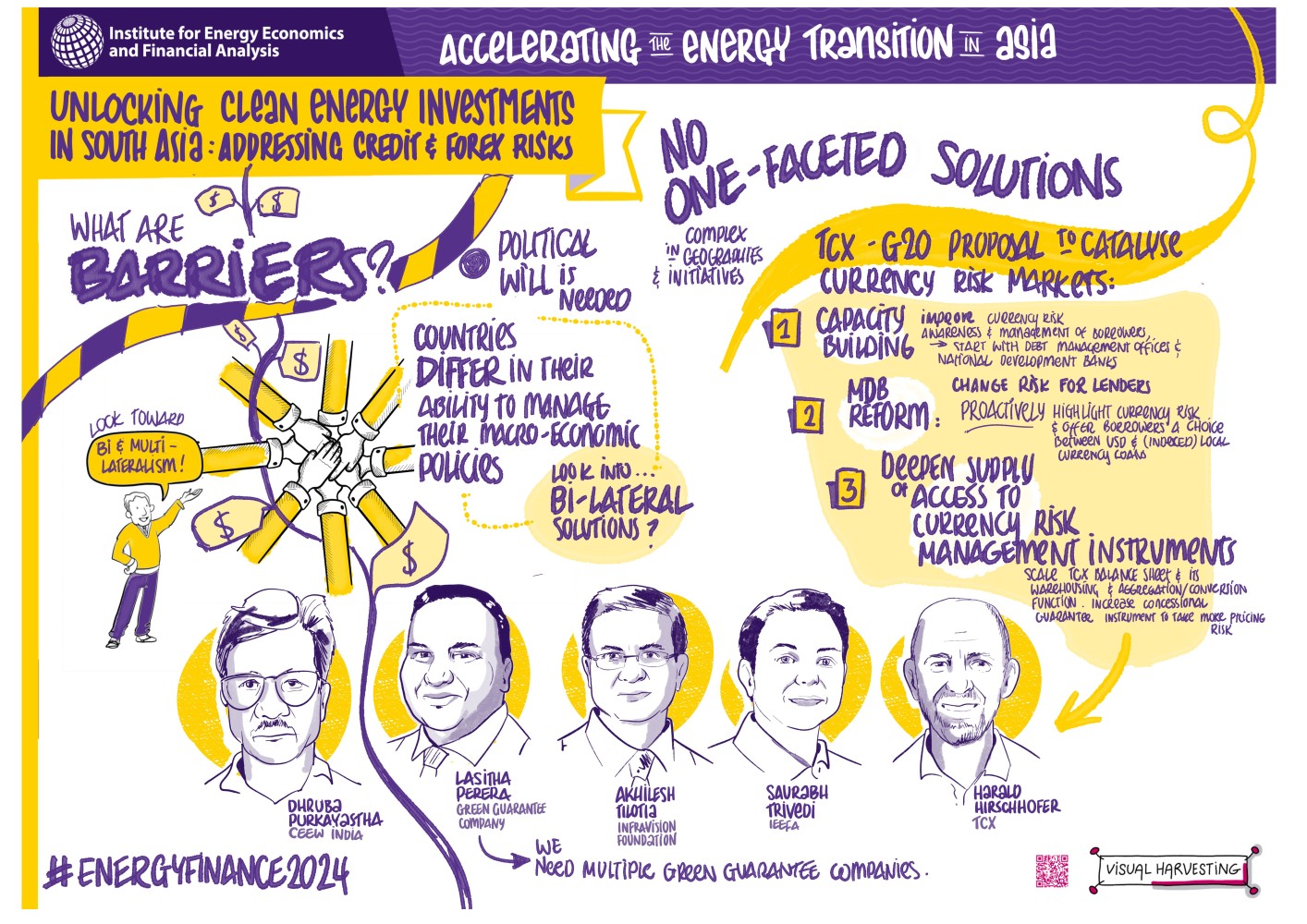
“Addressing credit and forex risks is key to unlocking clean energy investments in South Asia.” – Dhruba Purkayastha
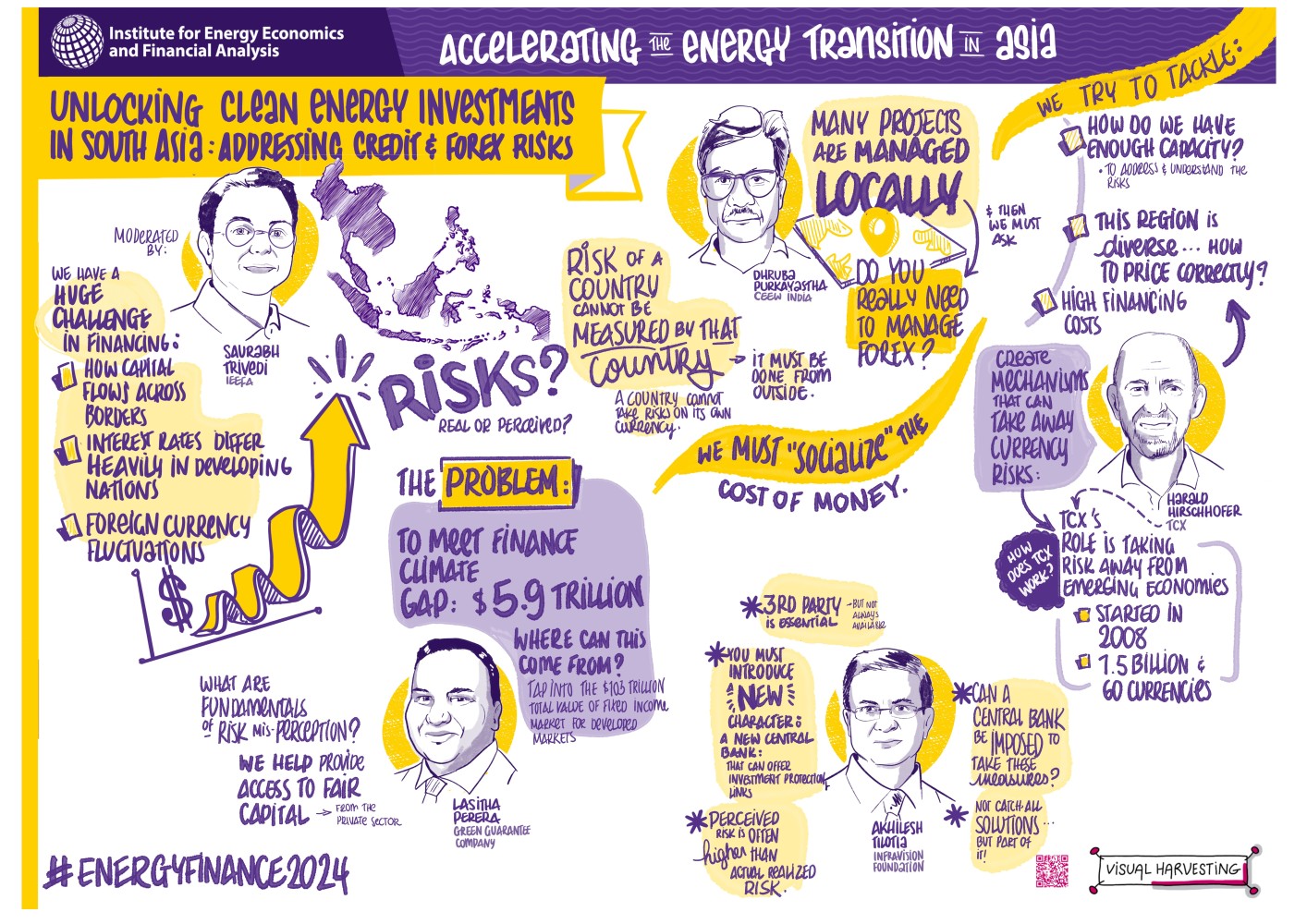

The Role of Green Hydrogen as a Global Clean Energy Commodity
Moderated by Paran Climate Consultancy's Anna Song, and featuring panelists Simon Nicholas, Kiran Kumar Alla, Kentaro Tamura and Dr Fiona Simon, this session elaborated on key opportunities and challenges along with potential solutions to increase green hydrogen in the energy mix. It also discussed financing solutions to accelerate the deployment of green hydrogen infrastructure.
This session was not recorded.
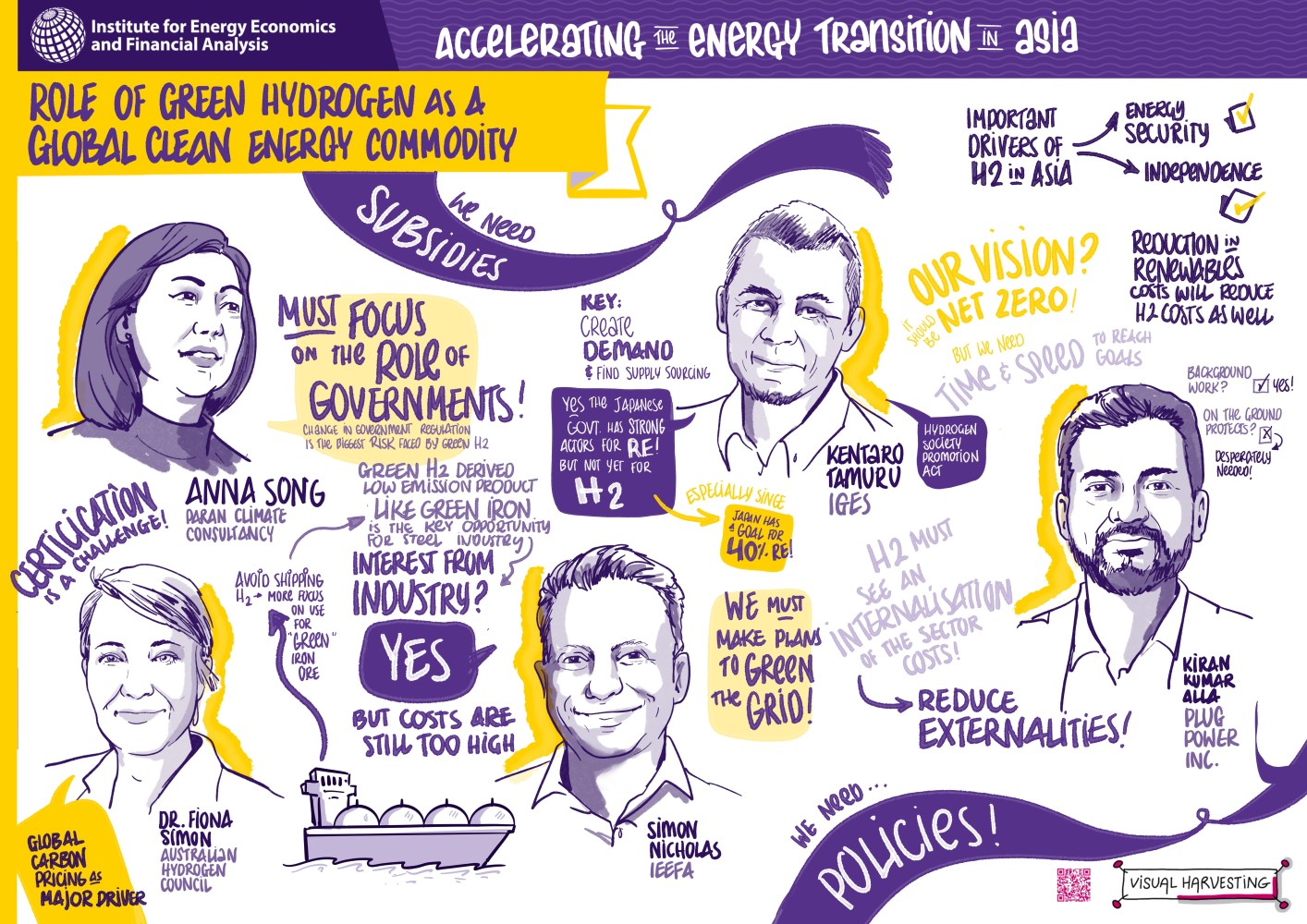
“Green hydrogen holds great promise but requires coordinated efforts to overcome existing barriers.” – Dr Fiona Simon

Role of DER and Energy Efficiency to meet energy transition goals
In this session, moderator Shafiqul Alam and speakers Muhammad Mustafa Amjad, Jay Gordon, Jyoti Gulia, and Khandoker Golam Azam discussed the critical role of distributed energy resources (#DER) and energy efficiency in achieving energy transition goals set during COP28, which aims to triple renewable energy capacity and double energy efficiency by 2030.
Key topics covered:
🔸 The vital role of DER and energy efficiency in achieving renewable energy targets.
🔸 Successful case studies showcasing DER implementation in the Asia-Pacific
🔸 Strategies to overcome challenges related to land use and grid capacity
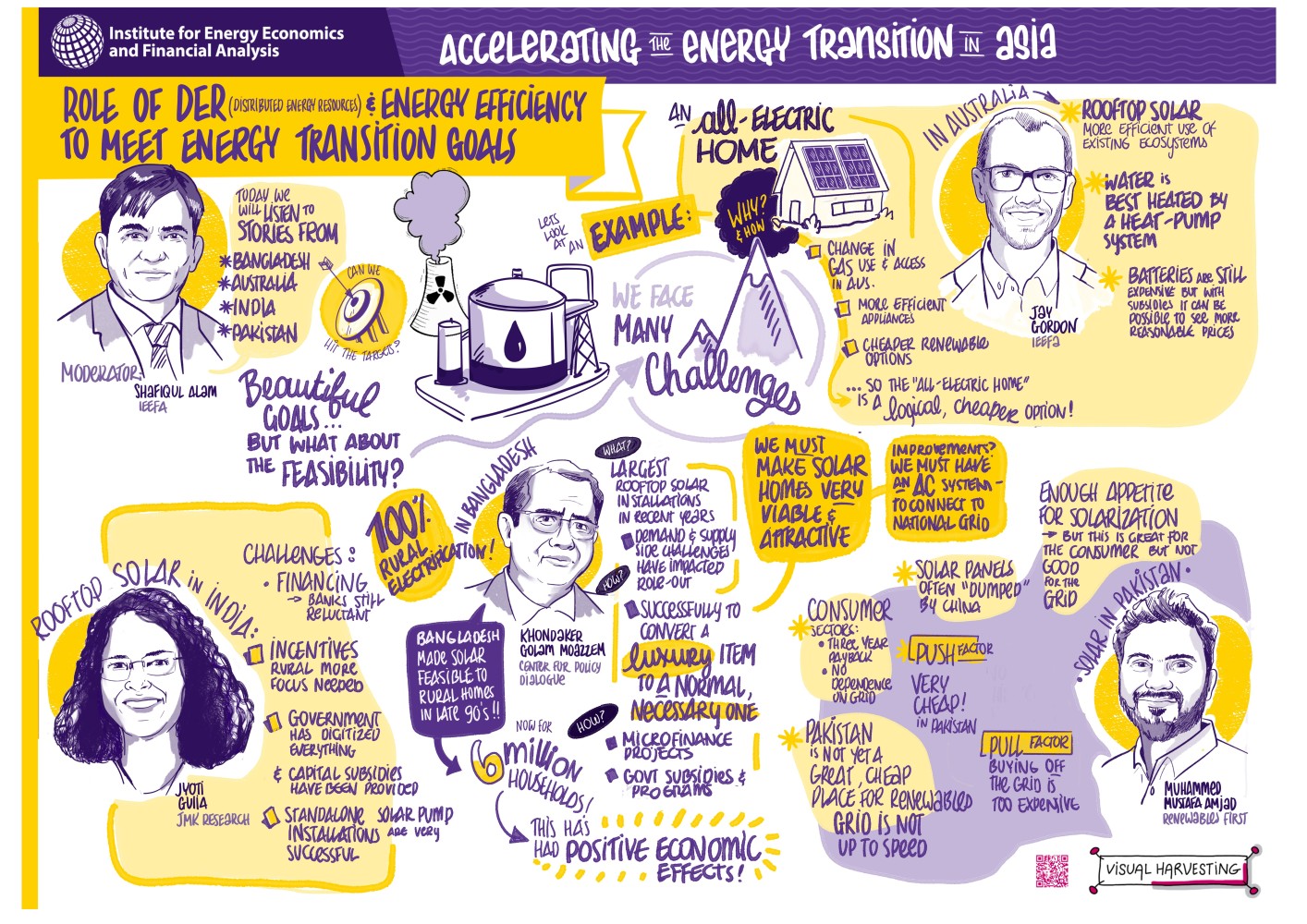
"DER is no longer 'small-scale' in Australia — it's now one of the largest generation sources. This unlocks a huge opportunity for efficient electric homes to reduce energy bills while supporting the energy transition, but only if our regulations and policies keep pace." — Jay Gordon
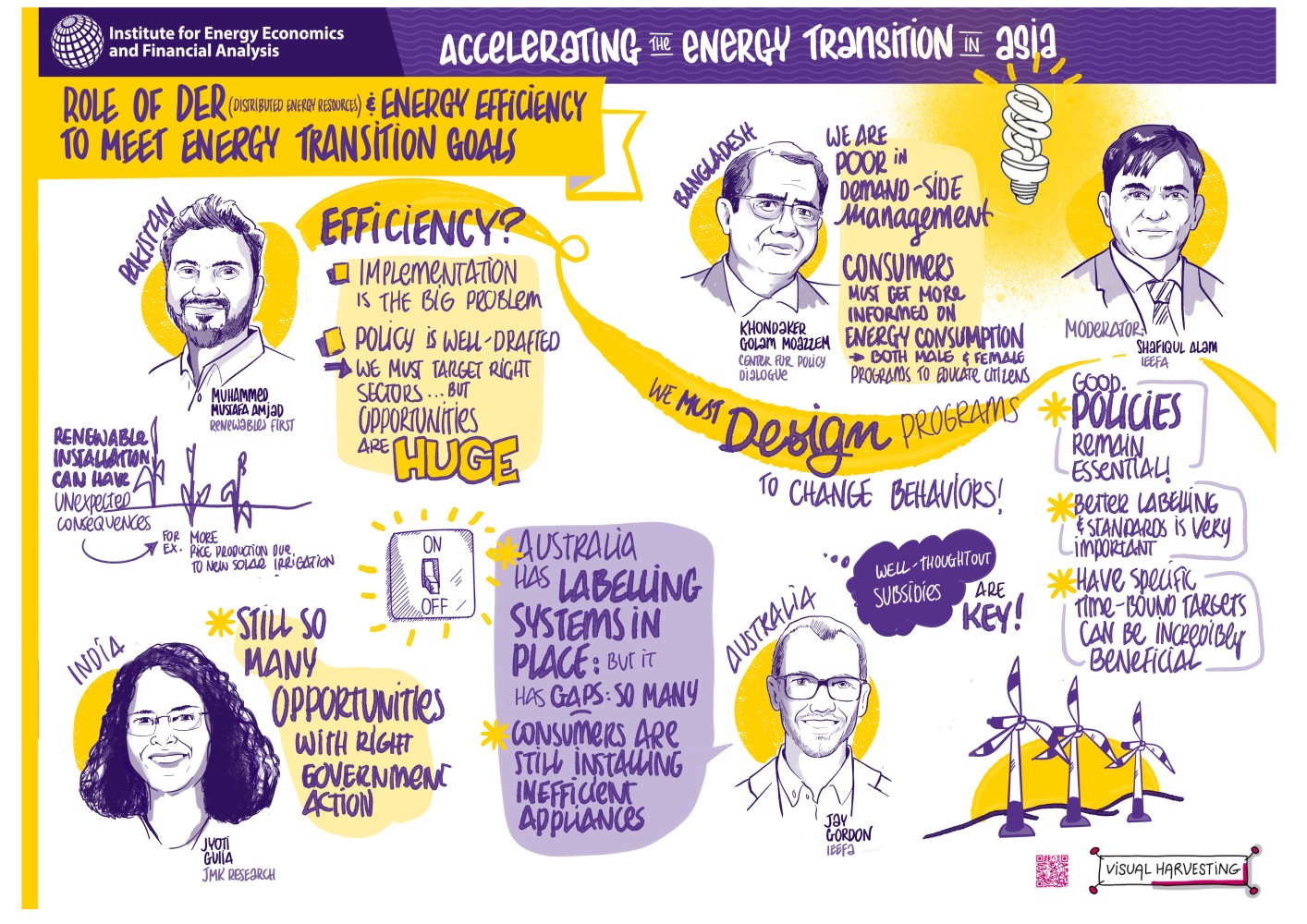

Japan & South Korea's Role in Asia's Transition
Moderator Christopher Doleman and panelists Dr Kimiko Hirata, Michelle Chaewon Kim and Seungwan (Alex) Kim discussed the pivotal roles Japan and South Korea play in the energy transition across Asia.
Key topics covered:
🔸 Technological Innovation: How Japan and South Korea can leverage advancements in clean energy technologies to enhance their energy security and reduce carbon footprints
🔸 Investment Strategies: The importance of strategic investments in renewable energy and energy efficiency measures
🔸 Policy Initiatives: Examination of both domestic policies and regional collaborations aimed at fostering sustainable energy solutions
This session was not recorded.
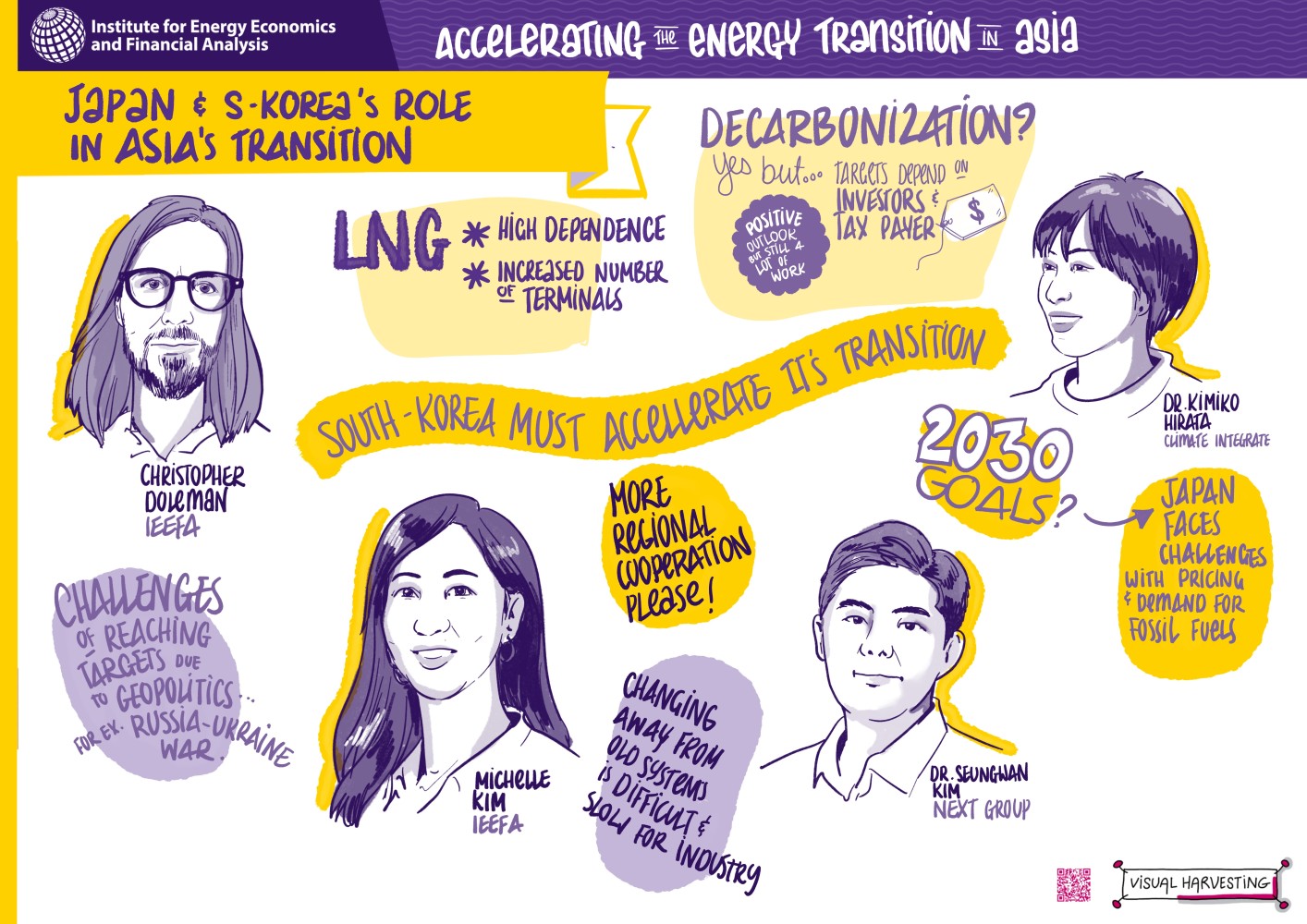

Regional Highlights — Energy Transition Success Stories: Ajaita Shah
Ajaita Shah opened Day 3 by discussing successful energy transition stories from the region. She is a driving force behind Frontier Markets, where she shapes vision, strategy, investments, and partnerships, transforming the lives of rural communities across India.
Key learnings:
👉 Her Mission: To elevate rural women leaders and link rural communities with high-impact solutions to address their life challenges
👉 Technology and Training: Employing a tech-driven approach and a network of women entrepreneurs to drive market access and service delivery
👉 Impact: Serving more than 5,000 villages, reaching 3.5 million rural households and delivering more than 100 million solutions
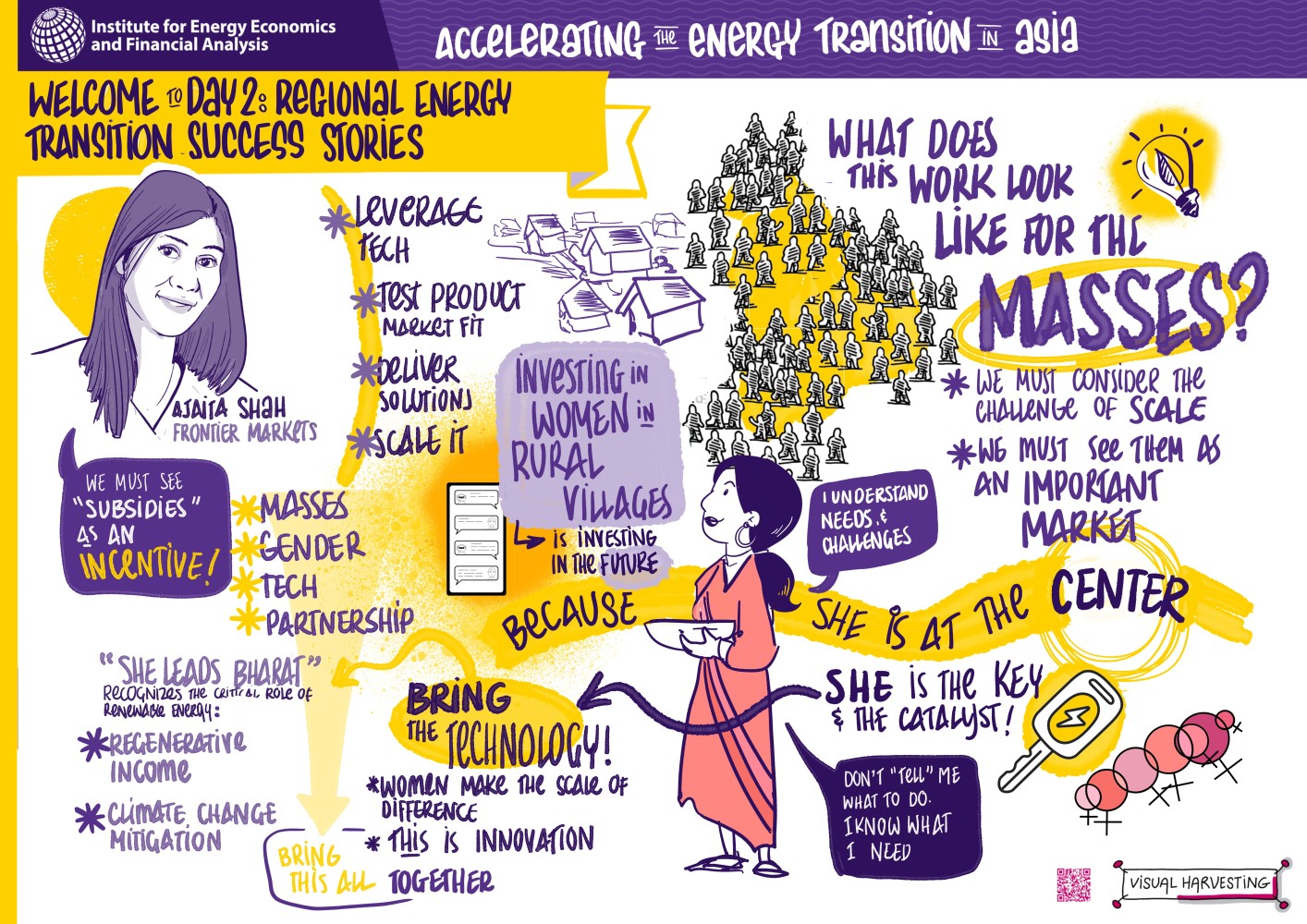
“Celebrating regional success stories highlights the progress made and motivates others to take bold steps towards energy transition.” – Ajaita Shah

Fostering a Carbon Market in Asia
This session, moderated by Shafiqul Alam and featuring experts IEEFA's Director for Europe Arjun Flora, Muhammad Rizal Azmi, Riza Suarga and Mahua Acharya, focused on the critical role of carbon pricing instruments — such as taxes and trading schemes — in addressing global greenhouse gas (GHG) emissions, which represent about 24% of total emissions. With 75 operational carbon pricing tools worldwide, the discussion highlighted the increasing importance of these mechanisms in achieving the targets set by the Paris Agreement.
Key topics covered:
🔸 Global Trends in Carbon Pricing: An overview of existing and emerging carbon pricing schemes, with particular emphasis on developments in India, Indonesia, and Malaysia. India’s lessons from its Perform, Achieve, and Trade (PAT) scheme and Indonesia’s recent launch of a mandatory Emissions Trading System (ETS) for the power sector were highlighted as examples of progress.
🔸 Building a Carbon Market: The panel discussed the essential steps to establish a carbon market from the ground up. This included legal frameworks, stakeholder engagement and the importance of robust monitoring and reporting systems.
🔸 Country Experiences: The session shared insights from countries that have successfully implemented ETS, detailing best practices and challenges faced during the process.
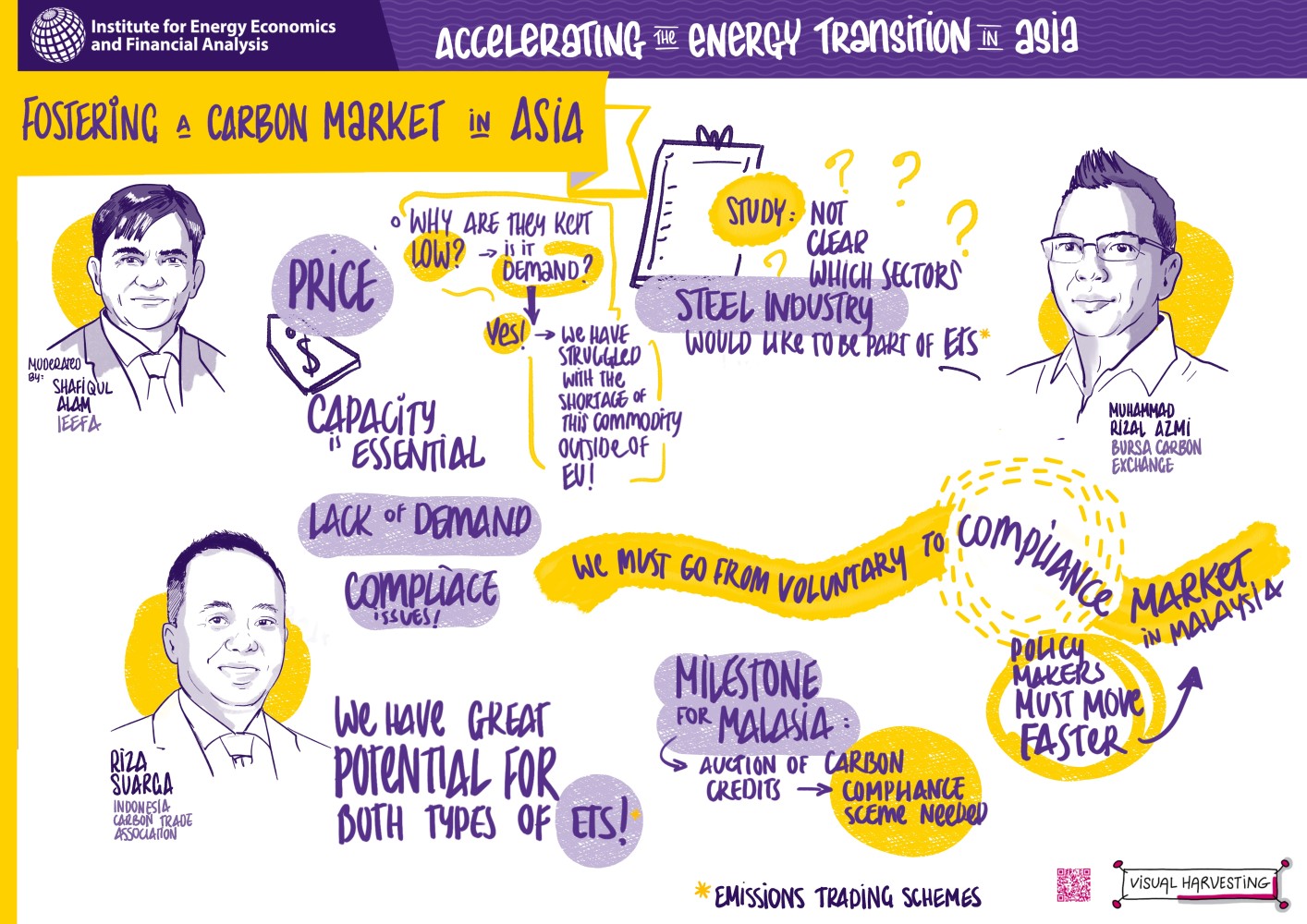
"There is a huge opportunity for Asian countries to apply learnings from established schemes in Europe and elsewhere, to create mandatory carbon markets that can provide the necessary financial incentives to drive decarbonization across multiple sectors of their economies." — Arjun Flora
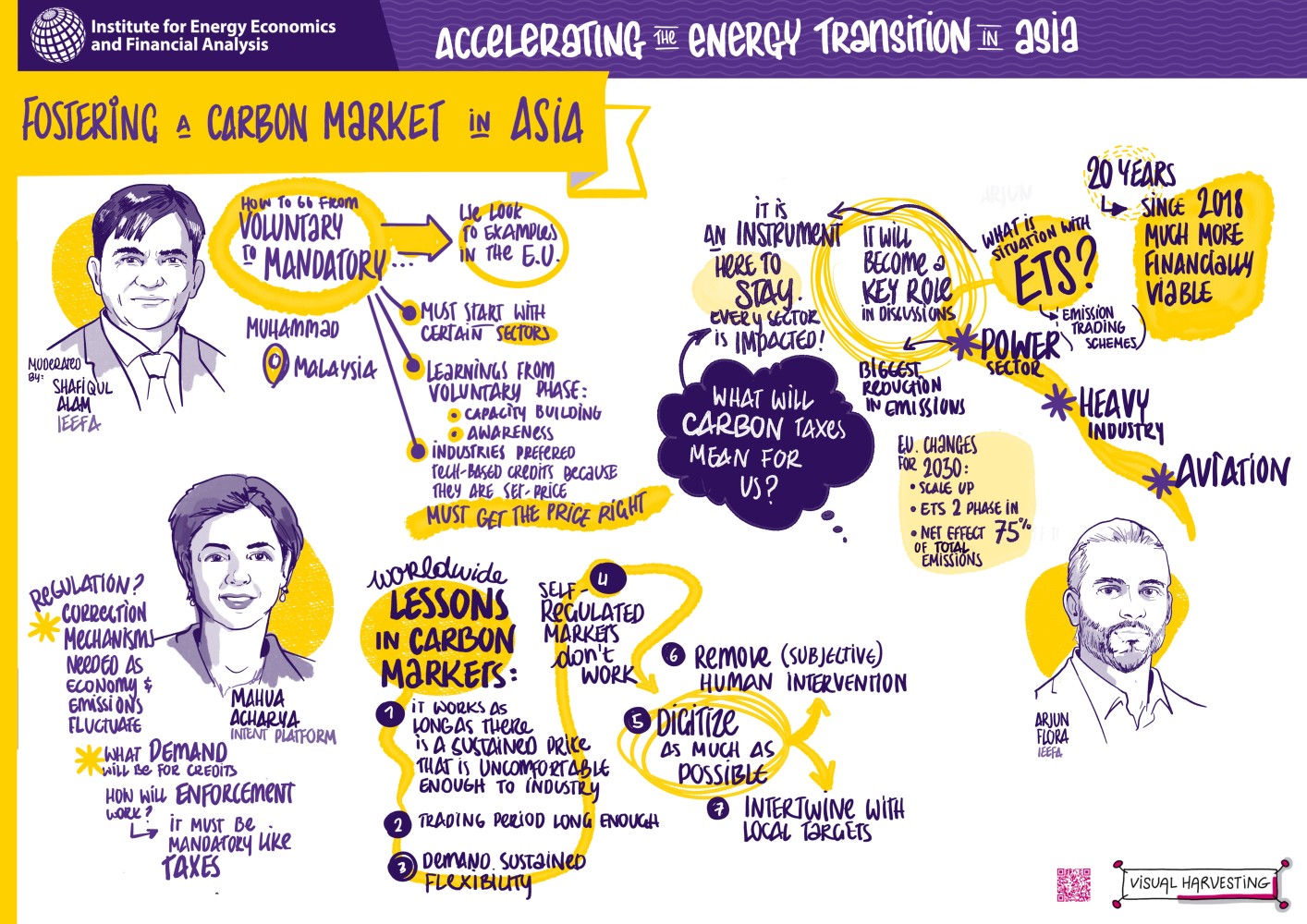

Decarbonizing Asia: Advancing Solar, Wind & Storage Technologies
EY-Parthenon's Abhishek Ranjan moderated this session with panelists Oscar Loza Duran, Ritwik Ghosh, Irene Maranan, Liming Qiao and Anissa Suharsono who provided valuable insights into how these three technologies can work together to accelerate #decarbonization efforts across Asia, addressing both opportunities and challenges while highlighting successful strategies for implementation.
Key takeaways:
🔸 Innovative Technologies: Oscar Loza Duran emphasized the latest advancements in solar and wind technologies, highlighting their potential impacts on energy generation and sustainability.
🔸 Challenges to Deployment: Ritwik Ghosh and Anissa Suharsono addressed common obstacles faced in implementing these technologies, such as regulatory hurdles, infrastructure limitations and financial barriers.
🔸 Supportive Policies: Irene Maranan and Liming Qiao underscored the importance of enabling policies and regulations, focusing on initiatives such as India’s round-the-clock tenders that combine solar, wind, and storage solutions. These policies are crucial to maximize the efficiency and reliability of renewable energy systems.
This session was not recorded.
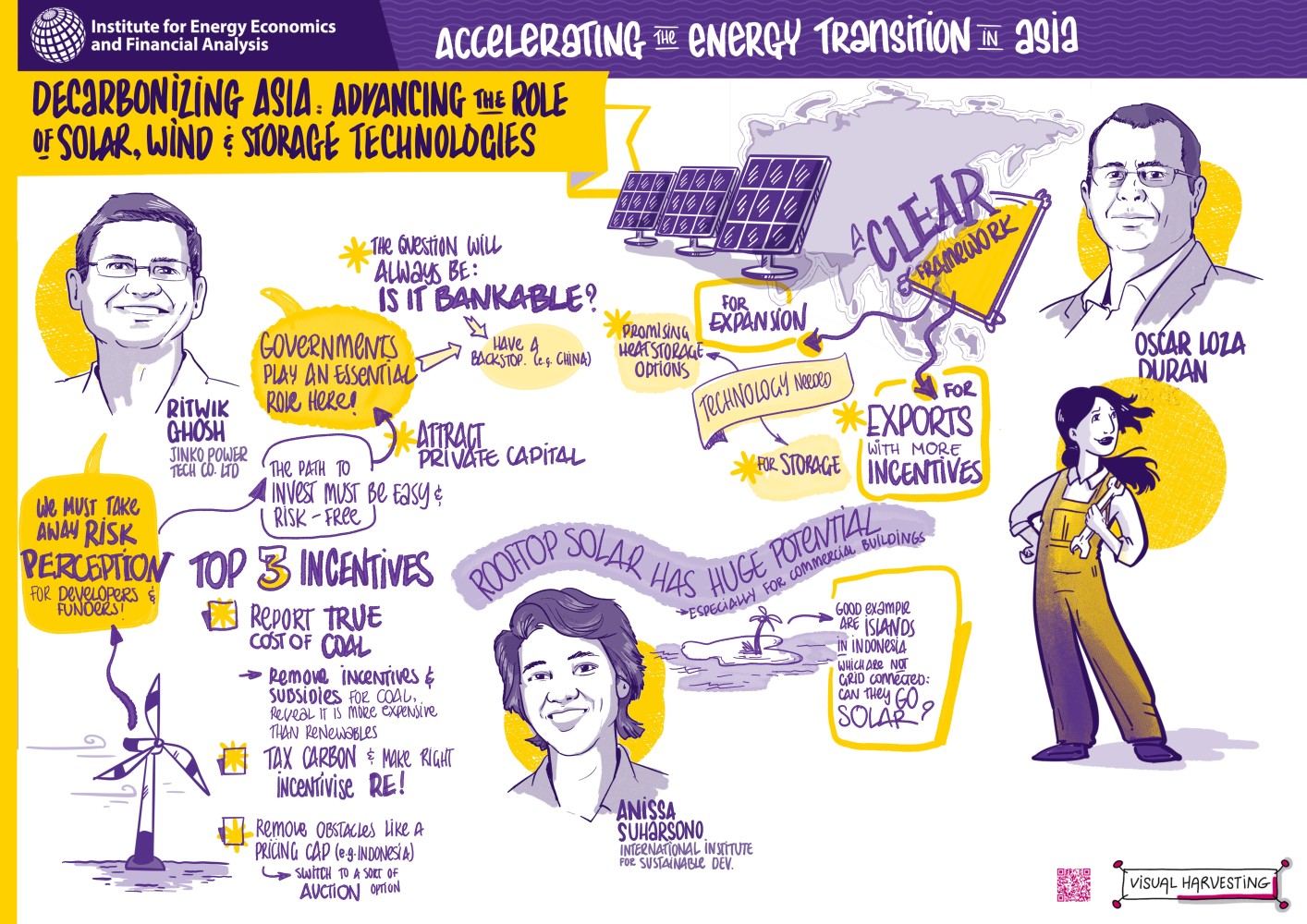

Resilient Pathways: Critical Minerals Supply Chain
Moderator Ghee Peh and speakers Brad Adams, Saksham Nijhawan and Shirley Wang discussed the crucial role of critical minerals and their supply chain in supporting clean energy technologies. They tackled the significant environmental and social challenges associated with the production of these minerals, which are essential for the transition to sustainable energy systems.
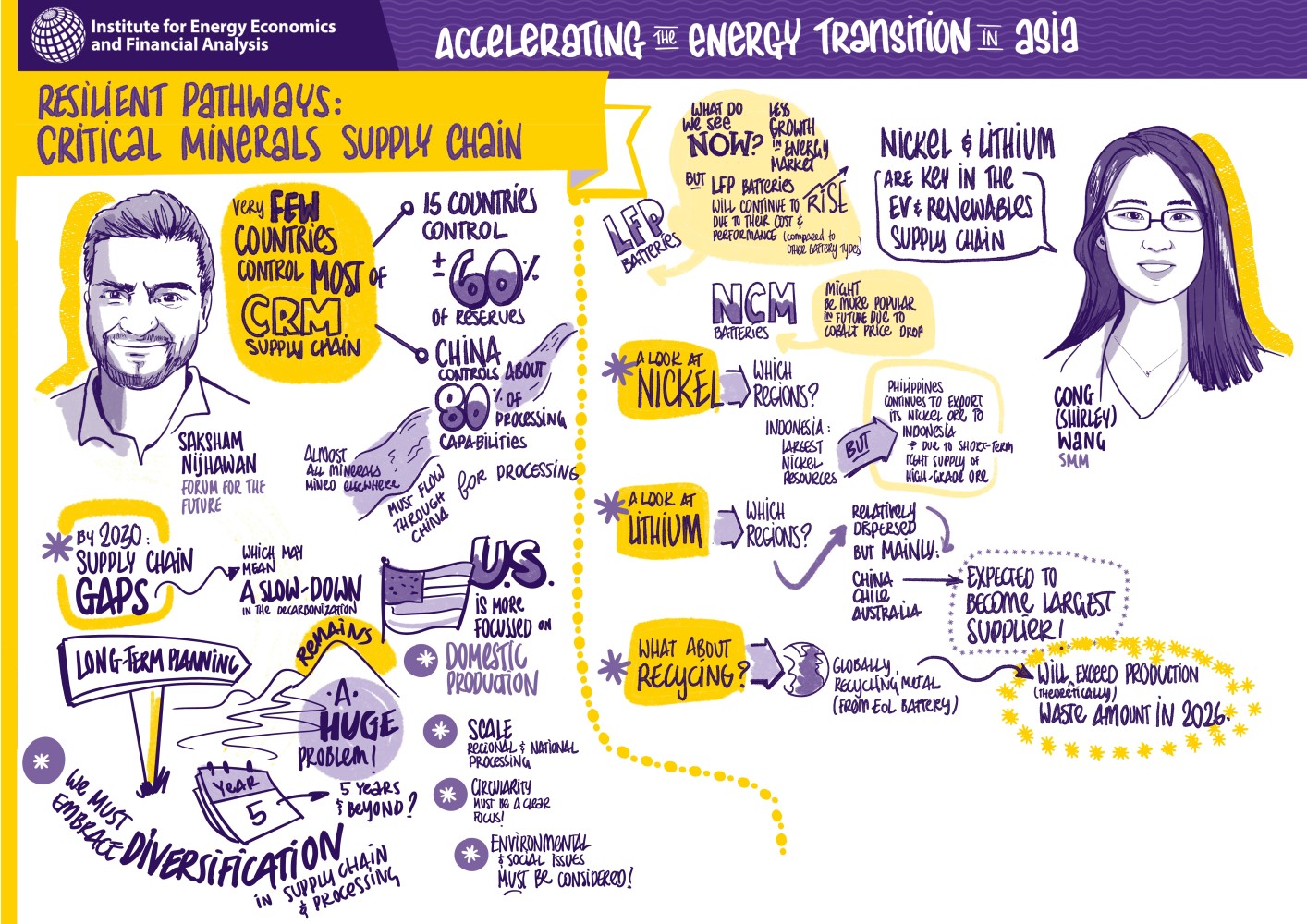
“Managing the supply chain for critical minerals is essential for supporting the clean energy transition.” – Ghee Peh
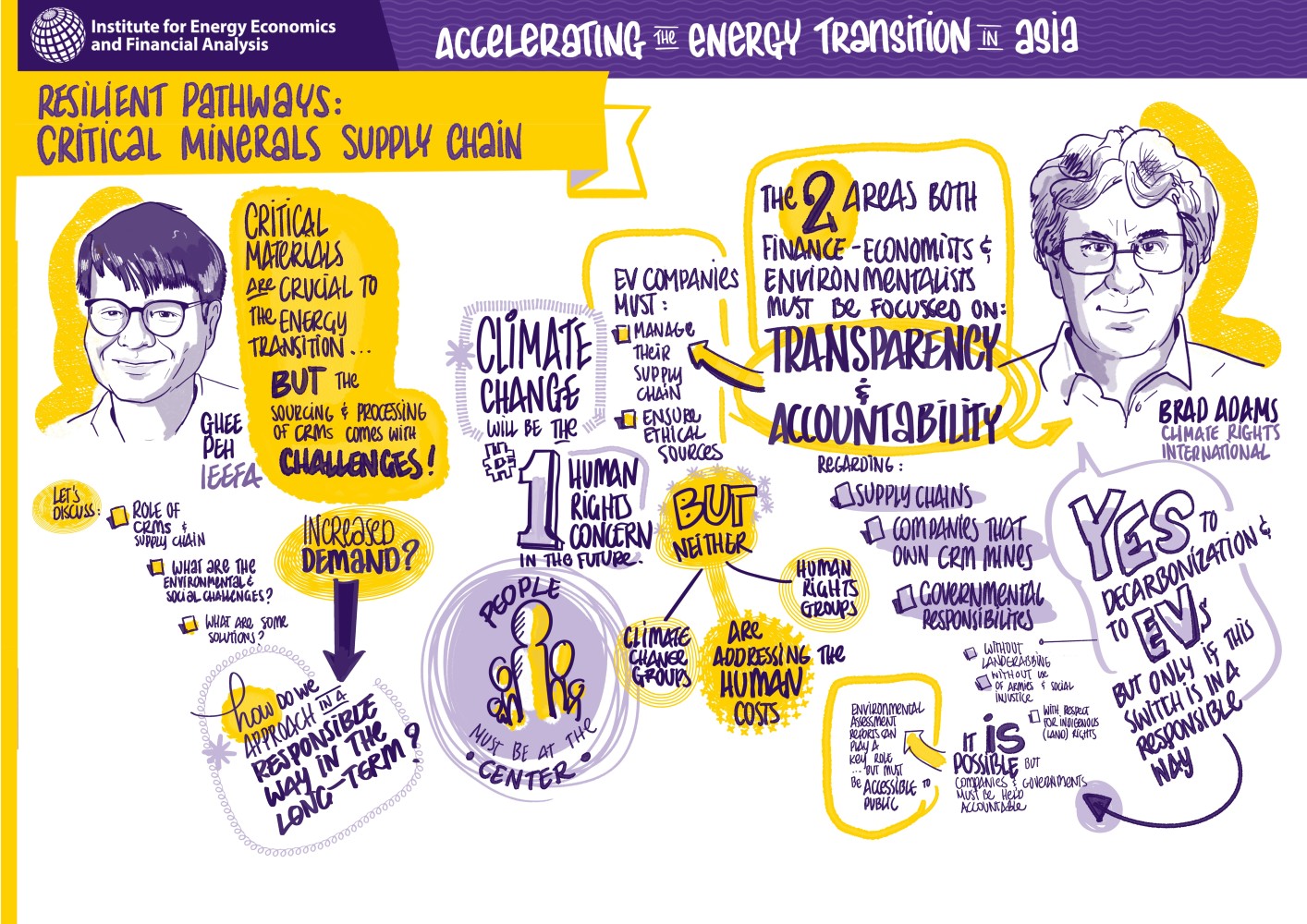

The Economics of Carbon, Capture & Storage (CCS)
These experts talked about a critical topic in the energy sector: The Economics of Carbon Capture and Storage (CCS):
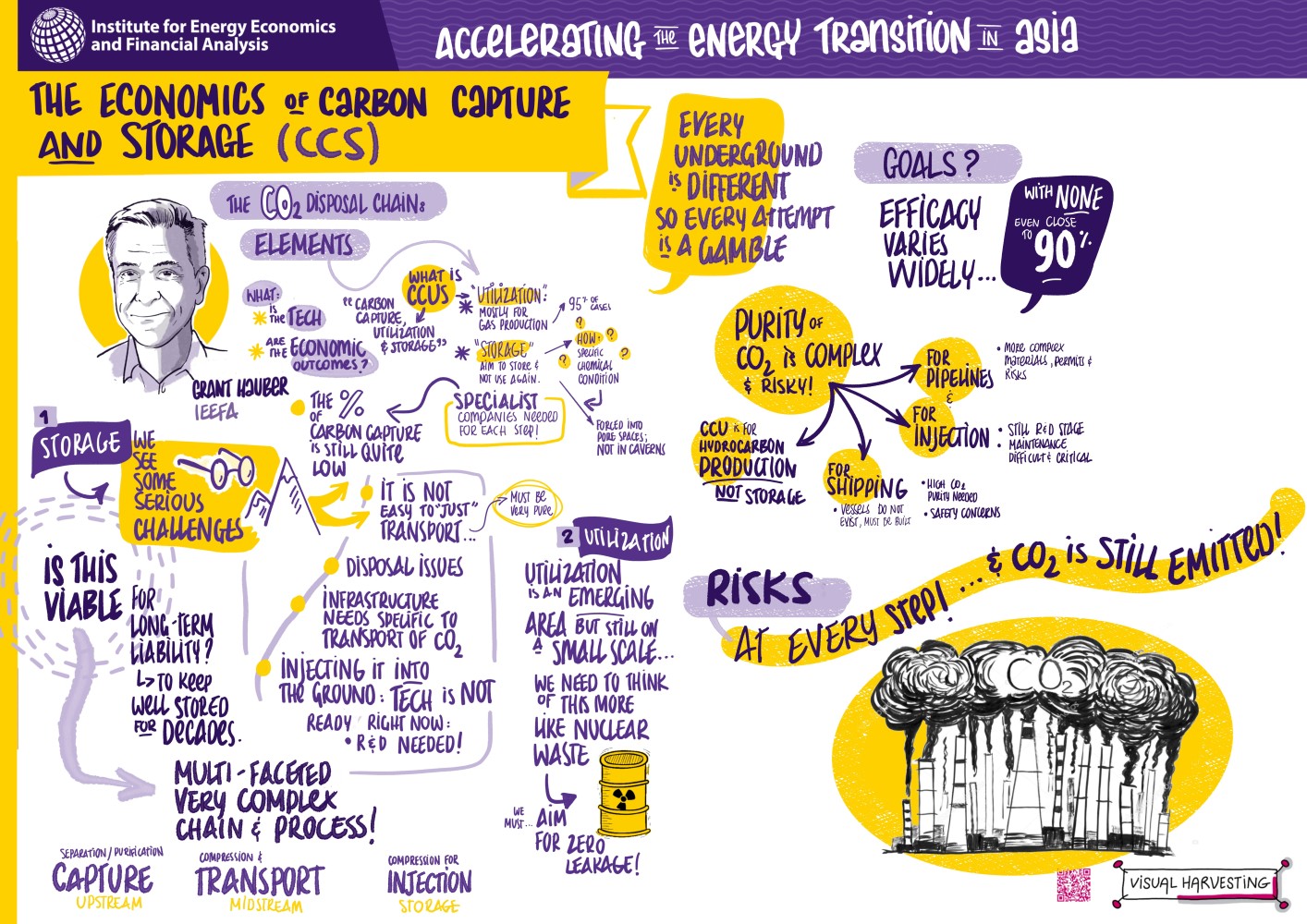
Grant Hauber, IEEFA's Strategic Energy Finance Advisor, Asia, shared a pivotal perspective: “CCS advocates spend a lot of time talking about capturing CO2, but this ignores the fact that the rest of the disposal chain does not yet exist. There is significant ongoing research, investment, and risk involved in making the entire process work. The return does not appear worth it.”
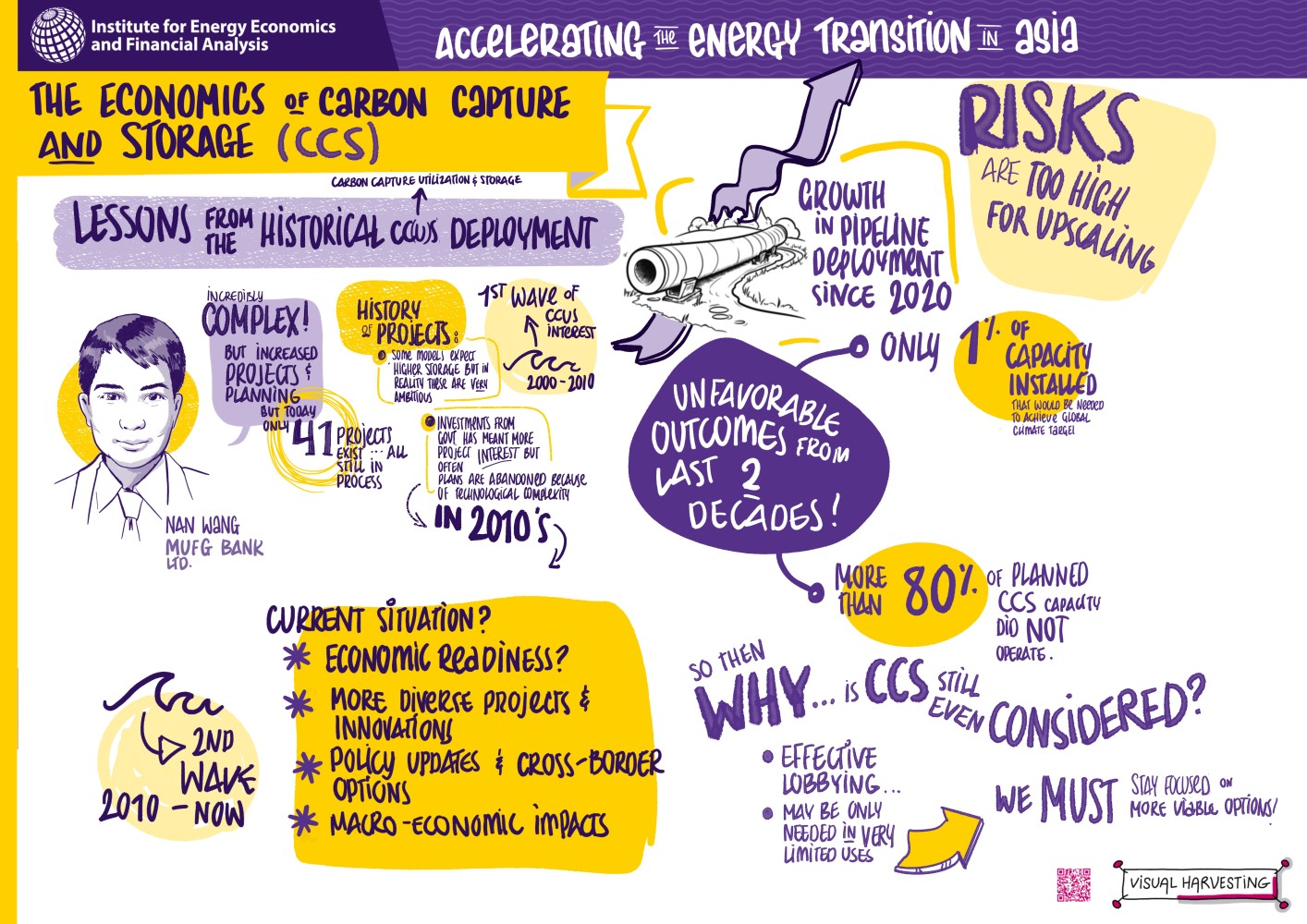
Nan Wang, Vice President, Sustainable Business Division at MUFG Bank, addressed the evolving challenges of CCS: “The risk of upscaling CCS was high under the social environment, techno-economic status, and the immature business model in the 2000s-2010s. While we see improvements in enabling conditions in recent years, whether these are sufficient to support a new wave of CCS deployment remains an open question.”
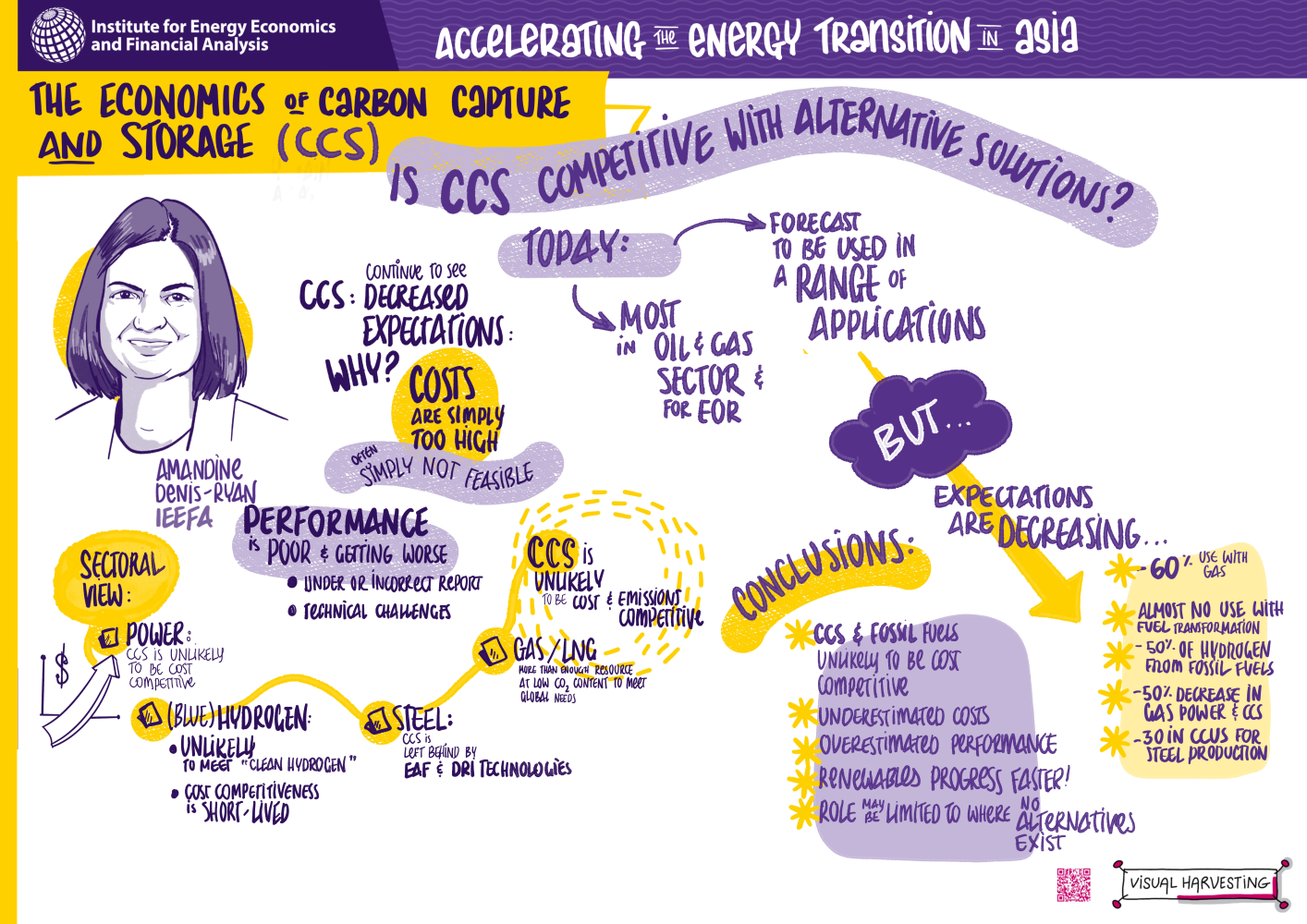
Amandine Denis-Ryan, CEO of IEEFA Australia, provided a sobering outlook: “CCS will only play a niche role. It won't be competitive with renewable solutions when associated with fossil fuels. The International Energy Agency has already halved its forecast since 2021 on the future role of CCS linked to fossil fuels in its net-zero emissions scenario.”
This session was not recorded.

The Role of Sustainable Finance for Energy Transition in Emerging Asian Markets
Moderator Shantanu Srivastava and panelists Minesh Pimple, Diana Tang, Dennis Wan and Chi Xiang Wong, CFA highlighted the significant progress and challenges in sustainable finance. They noted that global investment in the energy transition reached a record US$1.8 trillion in 2023, a 17% increase from the previous year. Key areas driving this growth include infrastructure projects such as renewables, stationary energy storage, hydrogen production, EV charging, and clean industry. In parallel, global sustainable debt issuance exceeded US$1.3 trillion in 2023.
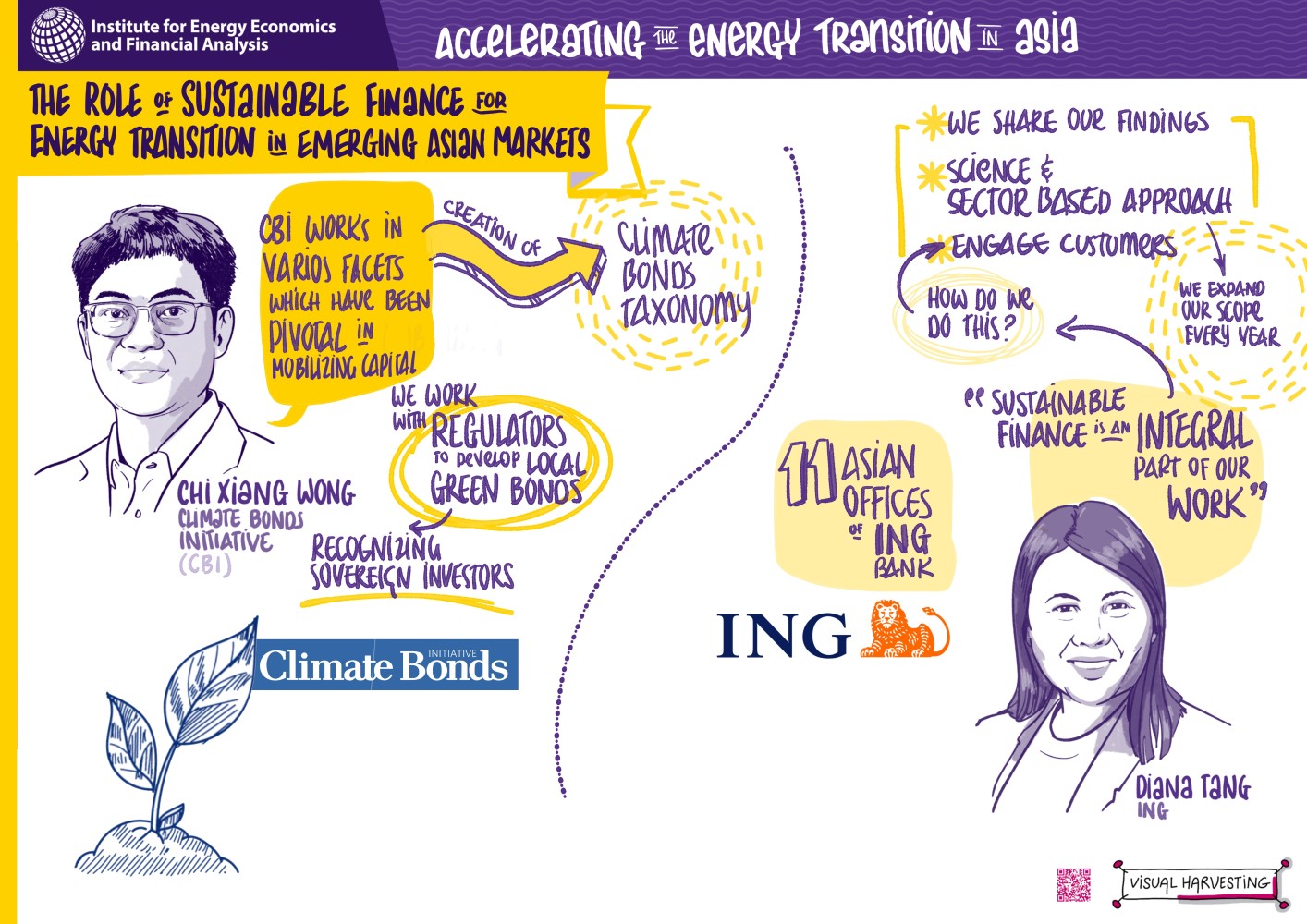
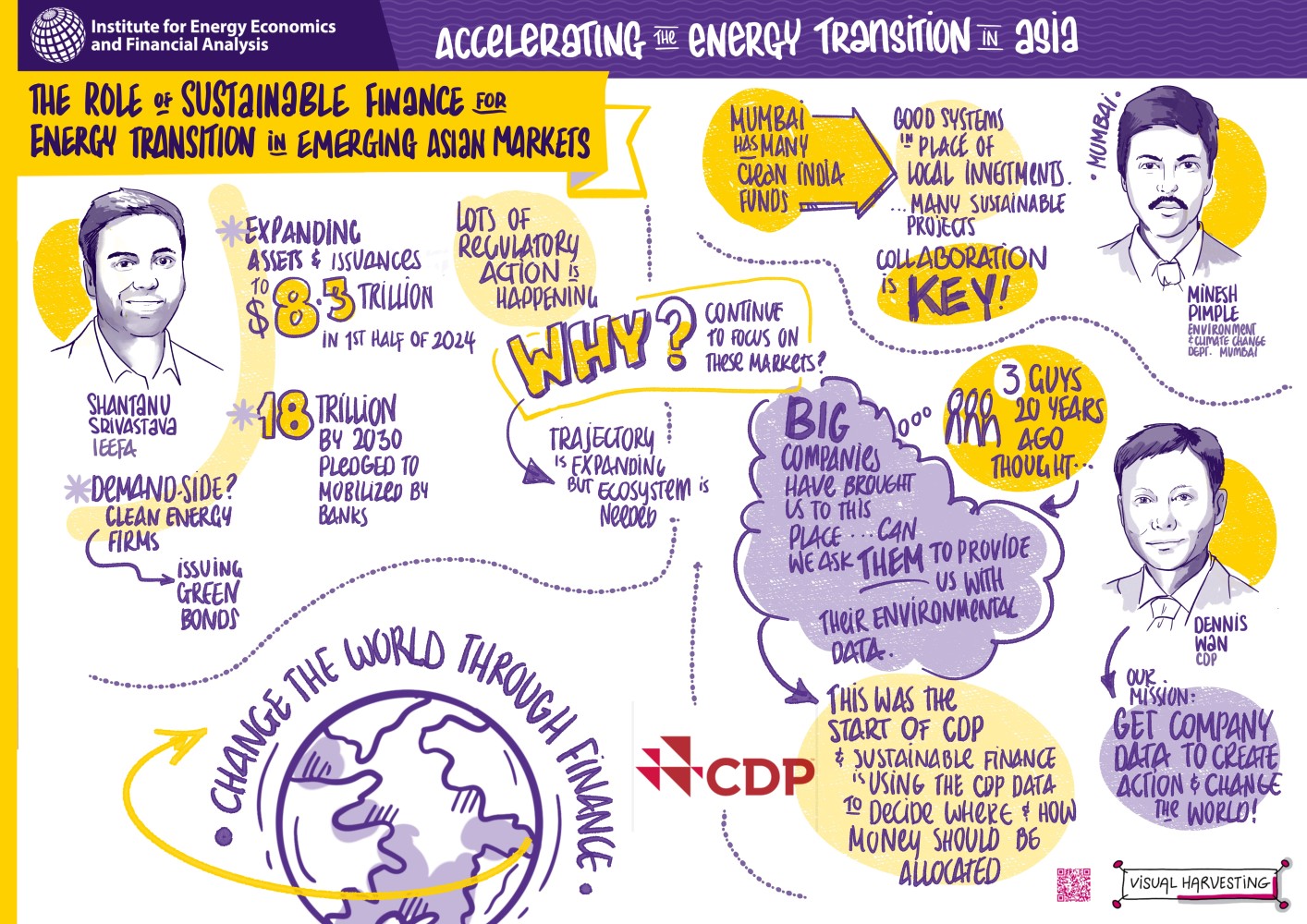
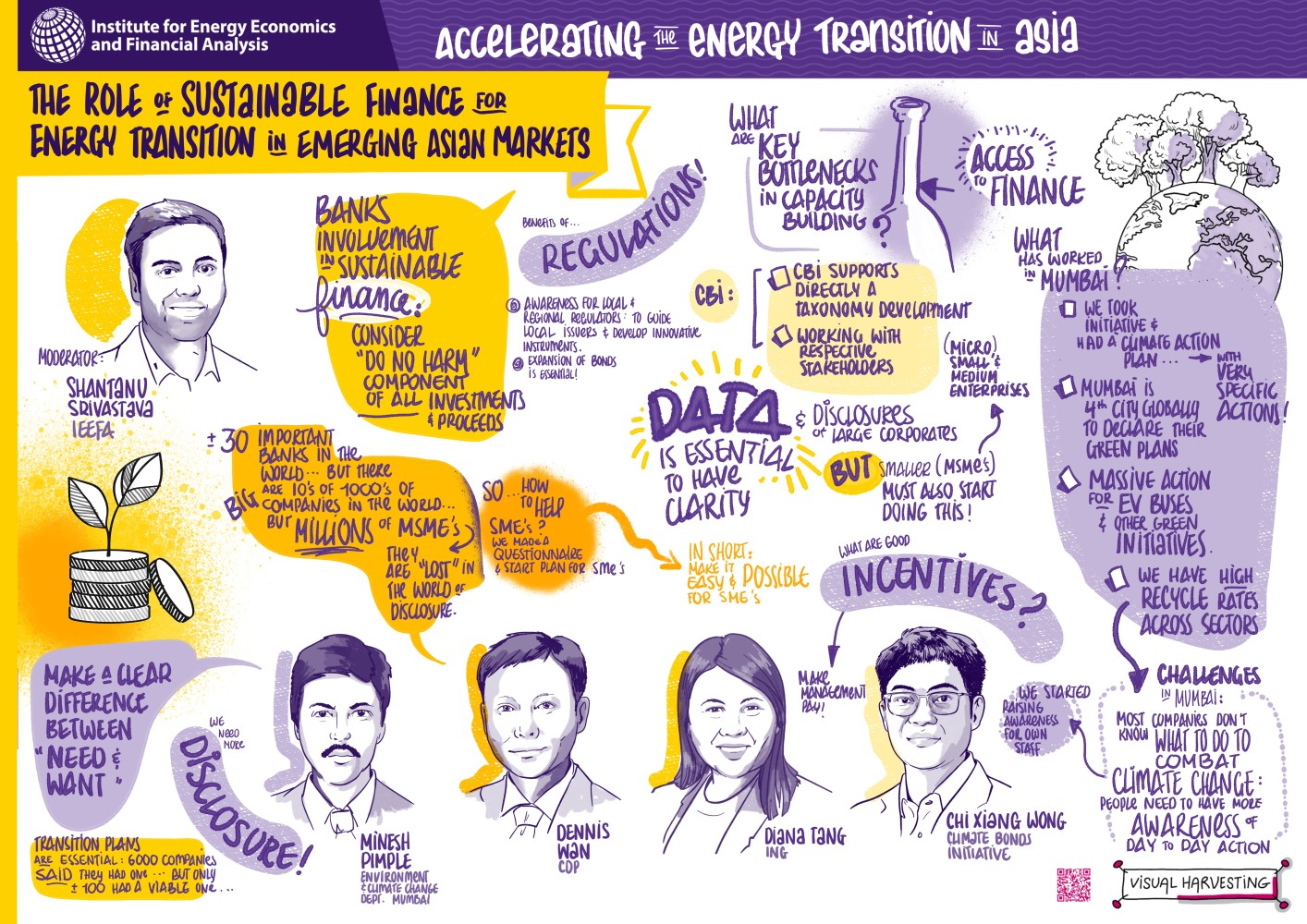

Uniting the Region: Inflection Points in Asia’s Energy Transition
The final session of #EnergyFinance2024, moderated by Sam Reynolds, featuring speakers Sonal Agarwal, Julia Skorupska, Namita Vikas and Azlan Mohd Kordi, highlighted the complex and often tumultuous trajectory of Asia’s energy transition, marked by technological innovations, investment flows, and political commitments.
Key takeaways:
🔸 Emerging Inflection Point: Asia is on the verge of a significant inflection point that could accelerate renewable energy deployment and facilitate the clean energy transition, primarily through unlocking capital.
🔸 Collaborative Framework: There is an urgent need to build a comprehensive framework that ensures scalability and bankability, incentivizing capital to flow toward effective solutions.
🔸 Challenges Ahead: While opportunities abound, challenges remain. A solid business case is essential for the energy transition to succeed. Key priorities include streamlining regulations, establishing tax incentives and policy frameworks, creating unified standards such as green taxonomies, and improving grid infrastructure.
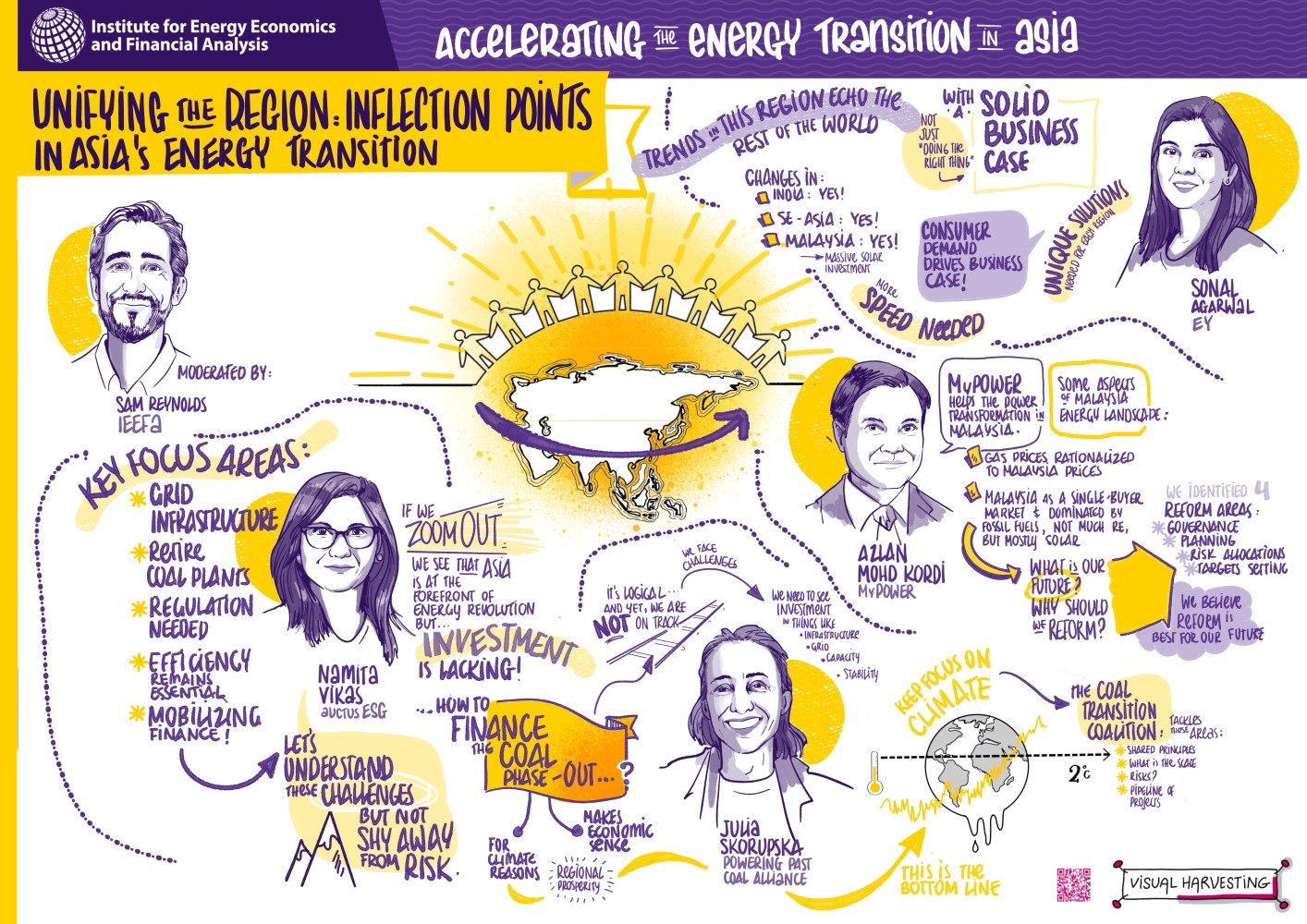
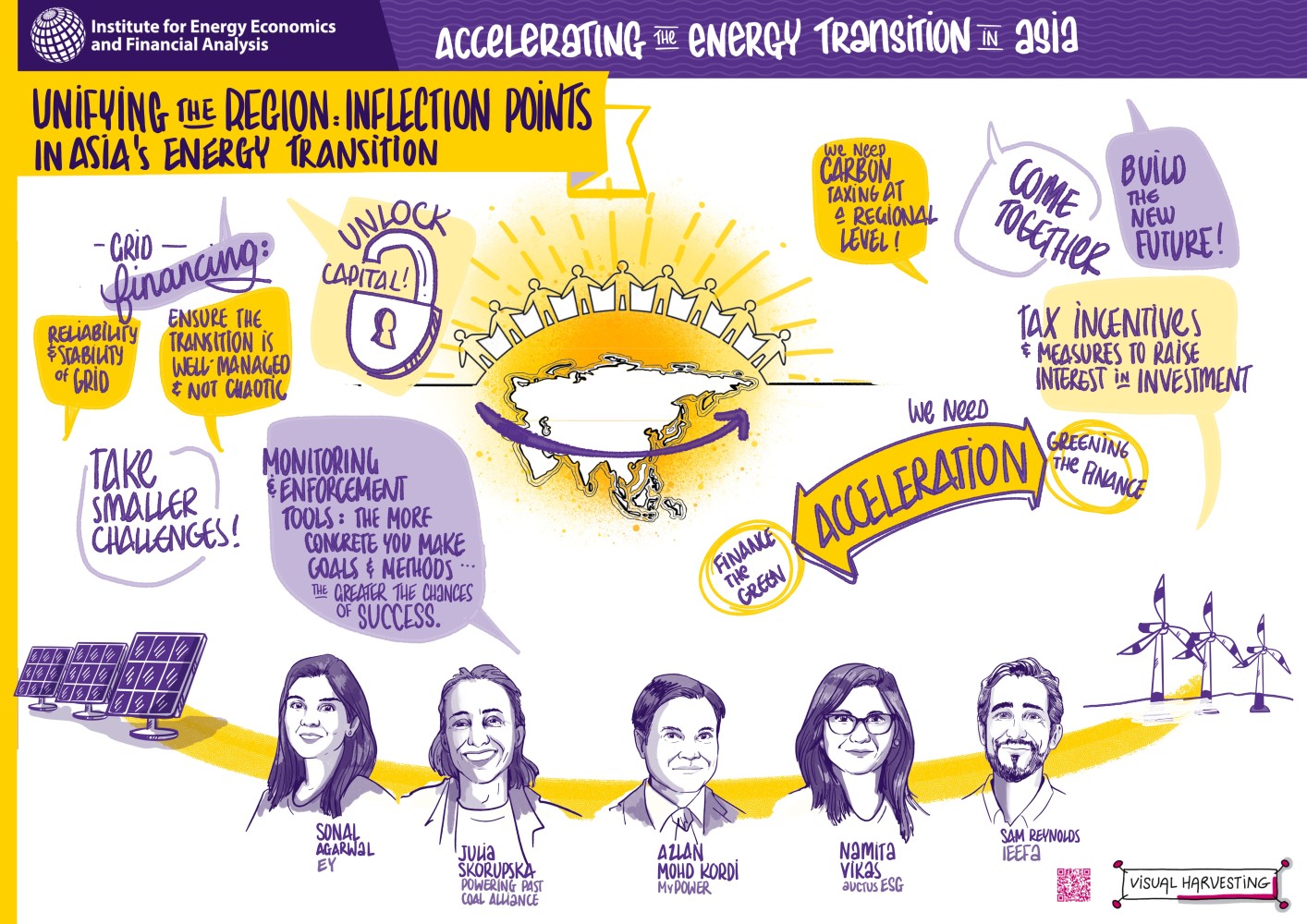

Closing Remarks
Vibhuti Garg concluded the conference, summarizing key takeaways and insights from the event.
“Our journey towards a sustainable energy future continues, and events like this are crucial in driving the conversation forward.” – Vibhuti Garg
The IEEFA Energy Finance 2024 Conference was a dynamic platform for exchanging ideas and shaping the future of energy finance and transition in Asia. We look forward to continuing these important conversations and seeing you at future events.
Thank you for joining us at #EnergyFinance2024!

IEEFA’s #energyfinance2024 conference took place September 2-4 in Kuala Lumpur and brought together energy and financial experts, policy makers, and communications professionals from around the world to focus on effective solutions to accelerate the transition in Asian energy markets.
Over 415 delegates attended the conference in person and virtually, taking part in 20 sessions and hearing from 81 speakers sharing their expertise and unique perspectives on crucial components of the energy transition.
IEEFA would like to thank everyone who participated in the event, ensuring our first conference in Asia was such a success.
A special thank you to Iris Mertens of Visual Harvesting for her session illustration services.
